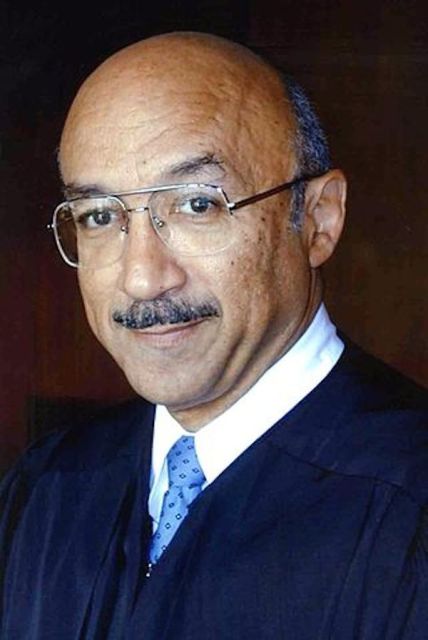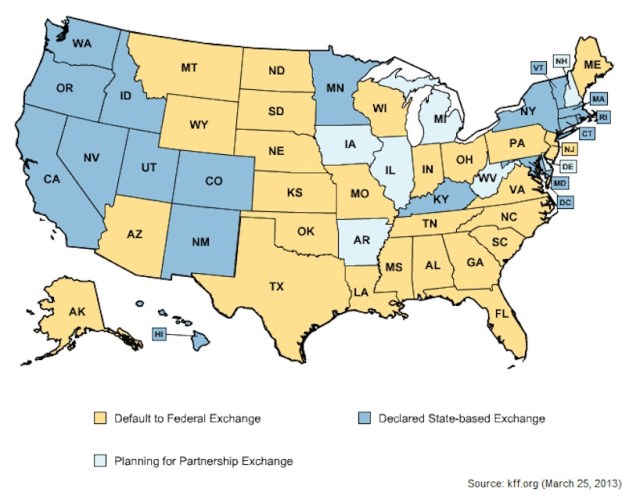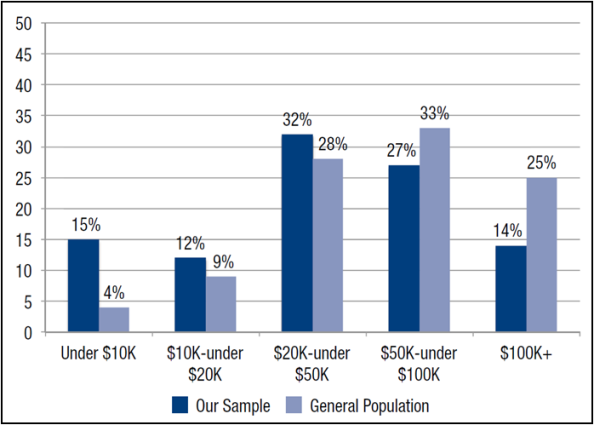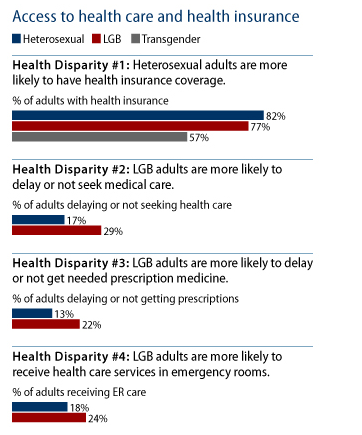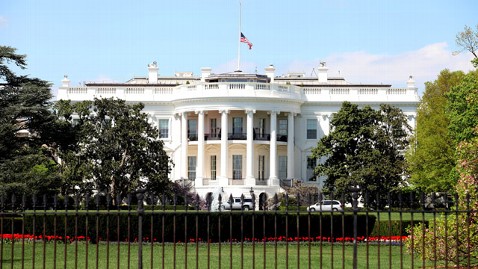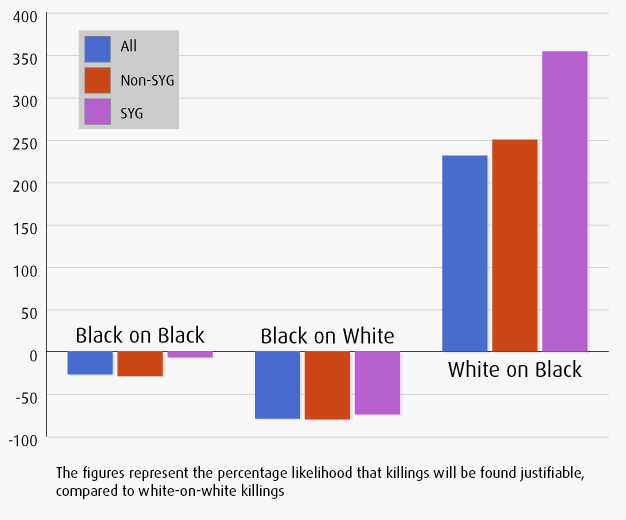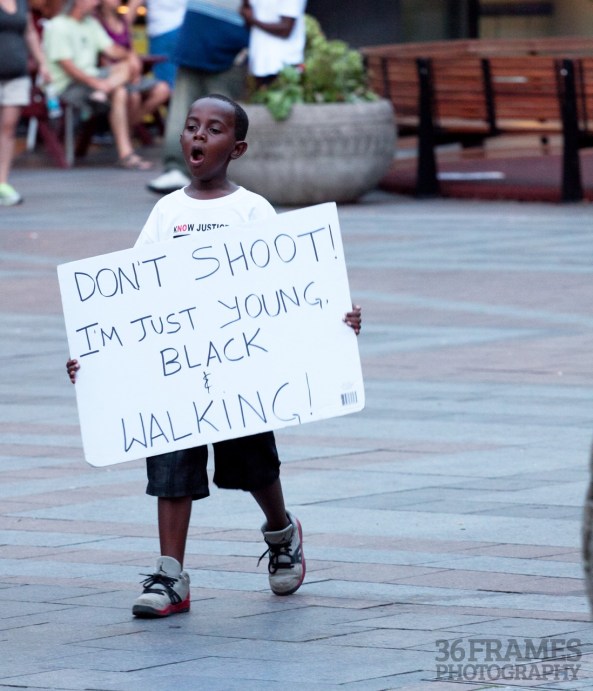Some Really Actually Good News: Obama Commutes Most of Incarcerated Trans Woman Chelsea Manning’s Sentence
With less than three days left in office, President Obama commuted much of Chelsea Manning’s remaining prison sentence. Manning is set to be freed in May 2017 instead of finishing her 35-year sentence which would have ended in 2045.
Manning, an army intelligence analyst, was convicted of a military leak in 2010 that shed light on abuses of detainees carried out by Iraqi military working with American forces and showed civilian deaths in the Iraq war were much higher than officials suggested, among other secret information. Manning made the files public in order to incite “worldwide discussion, debates, and reforms.” Wikileaks made the information known and was how the group came to prominence.
Prosecutors charged Manning with multiple counts of the Espionage Act as well as “aiding the enemy,” which later was dropped. Manning pleaded guilty to many of the charges brought against her in hopes for leniency in her sentencing but instead was met with the harshest punishment for a leak case.
“I take full and complete responsibility for my decision to disclose those materials to the public,” Manning wrote in her clemency application. “I have never made any excuses for what I did. I pleaded guilty without the protection of a plea agreement because I believed the military justice system would understand my motivation for the disclosure and sentence me fairly. I was wrong.”
She received a 35-year sentence and has been incarcerated at a male military prison in Fort Leavenworth, Kansas, which has proved to be more tortuous punishment for Manning since coming out as a trans woman.
She endured solitary confinement for 11 months during her pretrial confinement at Quantico and then was denied treatment from the prison for her gender dysphoria even though military doctors diagnosed her since 2010. After the ACLU pressured the military to allow Manning to live her life as a woman, they only allowed Manning to take hormones, wear women’s undergarments and some makeup, but have not allowed her to grow her hair longer than the male military-standard haircut and have not given her access to a surgeon that she can talk to about possible bottom surgery. All these factors have made it extremely difficult for Manning to live her truth as a trans woman. In the past year alone, Manning has attempted to kill herself twice. To add insult to injury, she was punished for her suicide attempt in July with solitary confinement.
In November, Manning applied for clemency, desperately asking Obama to commute her sentence to time served so that way she has a chance to live. “I have spent almost all of my adult life either homeless, in the military or in prison,” she wrote. “I haven’t had the chance to live my life yet.”
Last week, NBC News reported that Manning was on Obama’s shortlist for commutation. As President, Obama is granted power under the US constitution to fully pardon individuals who have been convicted of crimes, or to commute their sentences. Since November when Manning applied for clemency, many have urged Obama to commute Manning’s sentence saying it would solidify his legacy as “standing up for trans people’s rights.”
“The Obama administration has done many commendable things to protect the rights of LGBTQ people, but in the case of Chelsea Manning they have systematically mistreated her and denied her access to medically recommended gender-related healthcare,” Chase Strangio, the ACLU lawyer who represents Manning, told the Guardian. “Chelsea won’t survive another five years in prison, much less another 30.”
It’s still unclear how Obama’s decision may play out in regards to Wikileaks founder, accused rapist and seeming Russian hacking sympathizer Julian Assange, who has previously said he would allow himself to be extradited to the US where he would face prosecution if Obama granted Chelsea Manning clemency before his term ended. Currently Assange is “within the confines of the Ecuadorean embassy in London,” where he has sought political asylum for the past five years. At this time neither Assange nor Wikileaks have issued a statement.
As Friday fast approaches and our country’s impending doom under a Trump presidency will come to actualization, this was one of the last good things Obama could’ve done for us and for Chelsea Manning. He saved Chelsea Manning’s life and allowed her time to live, live, live — free from the confines of a male prison and out in the world as a trans woman. Credit goes to the trans citizens and activists who have worked tirelessly for Manning’s safety and freedom for many years now.
From Russia With Lies: Electors, Senators and the CIA Say We Need Answers on Russia’s Election Involvement
feature image via shutterstock
On Friday, the Washington Post reported that “the CIA has concluded in a secret assessment that Russia intervened in the 2016 election to help Donald Trump win the presidency,” and shared these findings in a closed-door briefing with senators earlier in the week. This isn’t necessarily surprising; Trump has praised Putin throughout his campaign, and literally told Russia that they should look into the Clinton campaign’s emails in his last public press conference. Back in August, Ivanka went on vacation with Wendi Deng, generally understood by many to be Vladimir Putin’s girlfriend at the time (although not confirmed by the state). CNN reported in October that there was “growing evidence” that Russia was working with Wikileaks and its founder Julian Assange; also in October, retired lieutenant general Jim Clapper made a statement “declaring that the US government and intelligence had concluded that senior levels of the Russian government had directed the hacking of Democratic political groups in the US and release of information from them with the intent of influencing the US election.”
To be clear, it doesn’t seem that the CIA report is suggesting direct election rigging by hacking voting machines; rather, it focuses on how both the DNC and RNC were hacked, but only information about the Democratic campaign was leaked to the public, implying a desire to smear one party and not the other, impacting the outcome of the election. Despite the apparent clarity of the CIA’s position on this, the FBI seemed to equivocate in the same closed-door meeting; the Washington Post’s source saying that “The FBI official’s remarks to the lawmakers on the House Intelligence Committee were, in comparison, “fuzzy” and “ambiguous,” suggesting to those in the room that the bureau and the agency weren’t on the same page.” Harry Reid, for one (whose status as an outgoing Senate minority leader means there’s little motivation to protect his own career) says he thinks it’s because the FBI is, essentially, compromised. He told MSNBC:
“The FBI had this material for a long time but Comey, who is of course a Republican, refused to divulge specific information about Russia and the presidential election… I am so disappointed in Comey. He has let the country down for partisan purposes and that’s why I call him the new J Edgar Hoover, because I believe that… I think he should be investigated by the Senate. He should be investigated by other agencies of the government including the security agencies because if ever there was a matter of security it’s this… I don’t think any of us understood how partisan Comey was.”
In response to this development, a group of senators including Republicans John McCain and Lindsey Graham, called on Sunday for an investigation into the issue of Russian involvement with the election. Mitch McConnell has shut down the idea of a dedicated committee; he and Paul Ryan both say that the House Intelligence Committee can handle investigating it as an instance of cyberhacking. The House, of course, is Republican-controlled, whereas a committee could be made bipartisan.
The findings of the group that ends up investigating the Russian involvement are, of course, on a tight time schedule; in 37 days Trump is scheduled to be inaugurated, and as he and his camp have declared that the CIA report is “just another excuse,” and implying that the CIA is incompetent anyway. Nothing that’s revealed about Russian involvement after Trump is in office will be acted upon, or maybe even known by anyone outside the investigation.
For this reason, ten electors — nine Democrats and one Republican — have petitioned for an intelligence briefing on the issue before they vote on December 19th.
“The Electors require to know from the intelligence community whether there are ongoing investigations into ties between Donald Trump, his campaign or associates, and Russian government interference in the election, the scope of those investigations, how far those investigations may have reached, and who was involved in those investigations,” they wrote. “We further require a briefing on all investigative findings, as these matters directly impact the core factors in our deliberations of whether Mr. Trump is fit to serve as President of the United States.”
The Clinton campaign has backed the electors’ request, and John Podesta has additionally stated “Each day in October, our campaign decried the interference of Russia in our campaign and its evident goal of hurting our campaign to aid Donald Trump… Despite our protestations, this matter did not receive the attention it deserved by the media in the campaign.” Obama made similar statements when he went on the Daily Show last night, telling Trevor Noah, “The real question that I think we all have to reflect on is what’s happened to our political system where some emails that were hacked and released ended up being the overwhelming story and the constant source of coverage — breathless coverage — that was depicted as somehow damning in all sorts of ways, when the truth of the matter was it was fairly routine stuff.” The overall meaning is clear: although Russian involvement seems pretty incontrovertible at this point, it was only one element of why Trump was elected on November 8th. It worked in tandem with misleading cable news and written coverage, “fake news” on Facebook and other outlets, and of course deep-seated American racism and sexism — after all, there were also public revelations and leaks about Trump’s reprehensible actions and views, from groping women to calling Mexicans rapists to nicknaming Alicia Machado “Miss Housekeeping,” and they don’t appear to have dissuaded many of his supporters.
In the meantime, Trump is making sure that Russia’s involvement in our government continues post-inauguration. His pick for Secretary of State, Rex Tillerson, has major business conflicts of interest in Russia; as chairman and CEO of Exxon Mobil, he has tried to pursue an “agreement with the state oil company to explore and pump underground resources in Siberia that could be worth tens of billions of dollars,” and opposed America’s economic sanctions on Russia because they blocked his project — Trump has spun these conflicts of interest as “vast experience at dealing successfully with all types of foreign governments.” He was awarded the Order of Friendship from Russia in 2013 “after signing deals with the state-owned Russian oil company Rosneft, whose chief, Igor Sechin, is seen as Putin’s loyal lieutenant,” and of course as an oil executive has worked towards “an illusion of scientific uncertainty around the overwhelming scientific consensus on climate change,” according to Neera Tanden, the president of the Center for American Progress. It’s harrowing, but fairly clear: if the US government can’t manage to take a stand against Russian influence on its workings by the time Trump is elected, we’re in for a lot more of it.
Nation Mourns and Organizes Against Police Violence as Obama Addresses Dallas
image attribution: Fibonacci Blue
We’re trying a new approach with our news coverage starting this week! Instead of posting two link roundups per week, as we’ve been doing, we will instead post at least two stand-alone stories throughout the week, with one longer link roundup at the end of each week. Thank you for reading!
This week, as the nation continued grieving the deaths of Philando Castile and Alton Sterling at the hands of police — and continued to learn about new ones, like Alva Braziel — protests were carried out across the country. Marchers blocked traffic in Chicago and marched to the governor’s mansion in Atlanta. In Oakland, protesters shut down both sides of I-880. Over the weekend, over 200 were arrested after protests in Baton Rouge, including activist and former candidate for mayor of Baltimore DeRay Mckesson, who was charged with “simple obstruction of a highway.” Other protestors, like Brittany Packnett, say that Periscope recordings of the protest prove that DeRay was on the side of the roadway line that officers had told them to stay on, and was arrested without cause:
“Deray was arrested last night while we protested for Alton Sterling in Baton Rouge. police directions were to stay on the shoulder as we walked back toward BRPD along Airline Highway. An officer approached him saying, “you with the loud shoes-if you step back into the street you’ll be arrested.” Deray remained with other protestors in our group on the shoulder, not crossing the line into the street-a fact proven by several periscope videos, including his. Just a few moments later, multiple police crossed onto the shoulder, tackling Deray and arresting him.
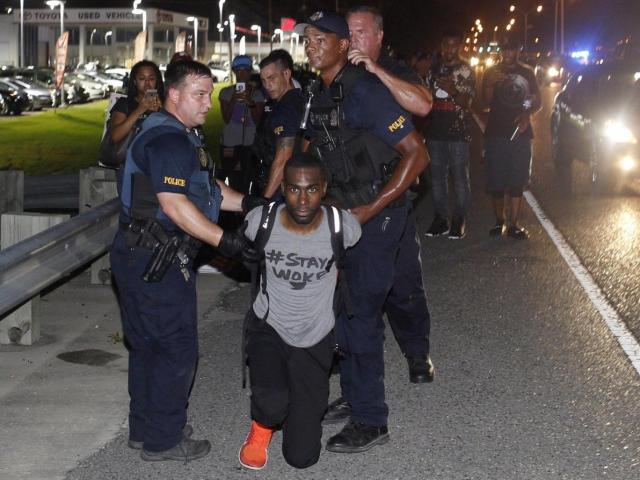
photo credit AP
Mckesson was released on Sunday, and gave a statement saying that he believed his arrest was unlawful.
In Dallas, the city is still reeling from the sniper attack that followed a peaceful protest last week and took the lives of five Dallas police officers. President Obama has visited the city and today gave remarks at an interfaith memorial service for the officers. He was also joined by George W. Bush, who moved to Dallas after the end of his term.
In the midst of the painful and frustrating national conversation on policing, racial justice and why so many lives are being taken in the course of routine police interactions, many are also focusing on the Dallas police department’s tactic for taking in Dallas sniper Micah Xavier Johnson: a mobile robot armed with C4, which detonated a wall behind Johnson and killed him. CNN has more details on the robot, which they say was purchased by the department in 2008 for $151,000. It doesn’t seem to be totally clear whether this particular robot came through the 1033 program, which allows local police department to purchase surplus military equipment, but according to NPR, “The Pentagon’s 1033 program, which supplies military weapons and vehicles to law enforcement agencies across the country, distributed 479 [explosive ordnance disposal] robots between 2006 and 2014.”
Although it isn’t new for law enforcement to use robotics, with past examples ranging from defusing bombs to delivering pizza to a suicide risk to coax him down, this is believed to be the first time US law enforcement has used it to kill a person. (This isn’t a new military use, however; “U.S. soldiers in Iraq have used similar robots to deliver explosives, arming them by duct-taping bombs to the device.”) According to CNN, robots can be fitted with different mounts to use items like:
- A modified 12 gauge shotgun, which can also be used as a breaching tool
- A gas can dispenser mount
- A window breaker
- A cable cutter
- Drills and saws
- Real time x-ray machines
- Mounts to combine with L6, L8 37mm or 40mm launcher weapons
One concern about the use of robots by law enforcement is what policies will govern their use (and if they’ll be enforced). Law professor Elizabeth Joh told NPR that “the effort to develop clear policies may result in a patchwork of local regulations similar to those for drones and body cameras.” It’s not clear how many robots like this are owned by police departments around the country; although those that come through the 1033 program are easier to count, there aren’t necessarily numbers on those bought from private companies like Northrop Grumman. The robot used in Dallas is reported to have “sustained minor damage to the extension arm and is still functional.”
These issues will remain on the minds of communities across the US as we head into the Democratic and Republican National Conventions, beginning on July 25 and July 18 respectively; it’s virtually certain that protests and direct action will continue in Philadelphia and Cleveland as activists work to bring greater attention and accountability around those being continuously lost to police violence.
11 States Sue Obama Administration Over Bathroom Guidelines for Trans Kids in Collective Tantrum
feature image credit verkeorg
A Temper Tantrum of Transmisogyny
+ Officials from 11 states are suing the Obama administration over its guidelines for bathroom access for trans students in schools. The suit itself is pulling no punches with the histrionics, claiming that the federal government has “conspired to turn workplaces and educational settings across the country into laboratories for a massive social experiment, flouting the democratic process, and running roughshod over common-sense policies protecting children and basic privacy rights.” The suit includes “nine states — Alabama, Georgia, Louisiana, Oklahoma, Tennessee, Texas, Utah, West Virginia and Wisconsin — as well as the governor of Maine, Paul R. LePage; the Arizona Department of Education; and school districts in Arizona and Texas.”
Addressing the possibility that the federal government could withhold funding from states that don’t follow its guidelines, Texas governor Dan Patrick said, “He says he’s going to withhold funding if schools do not follow the policy… Well in Texas, he can keep his 30 pieces of silver. We will not yield to blackmail from the president of the United States.” If you’re following the logic here, Patrick is willing to take away resources for all students in all public schools in the state… because he’s concerned about “protecting children.”
Will this lawsuit go anywhere? Hard to say at this point! Some think the state officials don’t have legal standing and the case will peter out:
“I see it as a political stunt, and a really unfortunate one because it’s at the expense of transgender people, including transgender youth all across the country,” said James D. Esseks, an American Civil Liberties Union lawyer who focuses on gender identity and sexual orientation issues. “They’re acting as though the Obama administration’s guidance that came out a few weeks ago is like the first time that anyone has interpreted federal bans on sex discrimination to cover transgender people.”
The lawsuit will go to Judge Reed C. O’Connor, who was appointed by George W. Bush, and some are already wondering whether it could make it to the Supreme Court.
Law & Order
+ Bill Cosby will go to trial regarding the sexual assault of Andrea Constand, and faces up to 30 years in prison if convicted.
+ In 2015, Gill Parker Payne shouted at a hijab-wearing Muslim woman on a Southwest Airlines flight to take off her hijab, yelling “This is America,” and when she did not, he tore it off of her. He has now plead guilty to obstructing her freedom of religion.
+ Vermont’s governor, Peter Shumlin, has signed a bill banning gay, bi and trans conversion therapy in the state.
+ The murderer of nine people in Charleston, SC, Dylann Roof, will face the death penalty in two trials, one in SC and one federally.
+ South Carolina’s governor has signed a bill banning abortion after 17 weeks in the state.
+ Chris Christie has vetoed a bill that would have kept domestic abusers form having firearms.
+ On Purvi Patel’s appeal of the charges of feticide and neglect of a child for which she’s currently facing 20 years in prison, and what it means for the future of the rights of pregnant people.
If we open up the application of feticide laws to such dubious evidence of guilt, every pregnant person in Indiana could be subject to jail time if their pregnancy does not result in a healthy birth. During Monday’s arguments, Judge Terry Crone asked the state about the where this burden lies, and whether someone with a “layperson’s knowledge” of neonatal care could know the impacts of their actions. According to Diaz-Tello, this questions implies the court’s consideration of a Due Process requirement. Namely, whether a person can be justly prosecuted for actions that they do not know to be criminal. The answer to this question will determine the fate of Patel, and potentially many others in Indiana.
+ Next week, Texas’s voter ID law will go to court in a suit brought by the NAACP and the Mexican American Legislative Caucus in an effort to keep over a half a million Texas voters, most of them of color, from losing their ability to vote in Texas.
+ The name of the conservative legal institution Alliance Defending Freedom has been popping up left and right lately when it comes to anti-LGBT legislation and policy — most recently, schools in Grayson, VA are claiming that the ADF drafted harmful anti-trans bathroom policy and encouraged them to implement it despite the Obama administration’s guidelines to the exact opposite effect.
+ A federal judge in Ohio just provided a ruling that could, if it becomes meaningful legal precedent, provide a foothold against the war on reproductive rights.
At least part of Barrett’s legal reasoning should be a slam dunk even in the eyes of the most conservative jurists. Last February, Ohio enacted a state law that not only strips a great deal of funding from organizations that “perform nontherapeutic abortions,” it also provides that groups which receive certain funding may not “promote nontherapeutic abortions.” Thus, the law does not simply strip money from groups that actually perform abortions (the two Planned Parenthood groups that brought this suit stand to lose a total of about $1.5 million), it also targets groups that engage in advocacy supportive of the right to terminate a pregnancy. That’s a violation of the First Amendment. As Barrett explains, the “unconstitutional conditions” doctrine provides that “the government ‘may not deny a benefit to a person on a basis that infringes his constitutionally protected . . . freedom of speech,’” even if the person has no constitutional right to the benefit itself. That is, the government isn’t obligated to offer funding to Planned Parenthood. But if it does do so, it cannot condition this funding on Planned Parenthood silencing itself.
Police & Prison
+ In Harris County, Texas, 77% of people in its jail are there only because they can’t afford to pay bail, and between 2009 and 2015, 55 people died in jail who were there because they couldn’t afford to get out. A lawsuit filed by Equal Justice Under Law alleges that at this point, Harris County is essentially imprisoning people for being poor.
+ Ireri Unzueta Carrasco has been protesting for improved civil rights and legal status for undocumented youth; now the Department of Homeland security says this makes her a “public safety threat” and is using it as pretext to deny renewal of her Deferred Action for Childhood Arrivals status. The link contains a petition to reaffirm that protest is a civil right, not an indicator that someone is a threat.
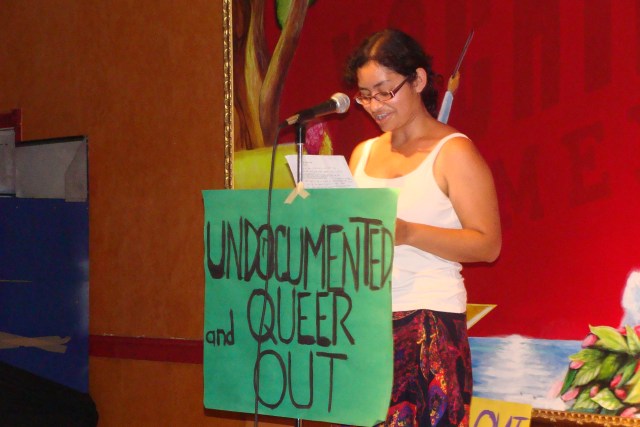
Ireri Unzueta Carrasco
+ The trial of Officer Edward Nero, one of the six officers involved in the arrest and subsequent death of Freddie Gray in Baltimore, MD, has ended in him being acquitted of all charges. Also now two of the officers involved are suing attorney Marilyn Mosby for defamation, so.
+ In a truly horrifying story, a Black student at a middle school — middle school! — in Virginia was arrested for “stealing” a single carton of milk in the school cafeteria even though the student was on the free lunch program, meaning that he was entitled to the carton of milk already. Despite the lunch program revelation, the school appears to be standing by their decision to involve law enforcement officers, citing “being disrespectful and using his cell phone in school,” as well as “pulling away from the officer and appearing fidgety,” charges which, I think is clear, apply to virtually every student in middle school at one time or another. This is unspeakably awful!
Election News
+ The State Department has released a report declaring that Hillary did break State Department rules with the server she had emails on; it’s unlikely to really change much as far as Dem opinion of Hillary, but Trump will likely take the report and run with it.
+ Donald Trump has a new plan to try to smear Hillary Clinton on a real estate controversy from over a decade ago — we know this because Trump’s “spokeswoman accidentally emailed a Politico reporter the inside details about a new plan to attack Hillary Clinton over a very old real estate scandal. Hope Hicks appears to have confused the reporter with a Trump campaign adviser who has a similar name.” In reading about this I also learned about how “James O’Keefe forgot to hang up after leaving a phone message for the Open Society Foundations, a nonprofit founded by liberal billionaire George Soros. O’Keefe planned to “investigate” Soros-linked entities for “wrongdoing,” using his time-tested tactic of impersonating someone he’s not. He explained all to his staff on a seven-minute voicemail he unknowingly left for someone who works for Open Society.” Amazing.
Research & Data
+ A new report shows that — unfortunately, not surprisingly — young men of color feel unheard, like there’s no future for them, and that they need resources they can trust.
[Boys and men of color] are extremely stressed out, taken off task by distractions and temptation, don’t believe in the American Dream and can barely see beyond surviving. They feel trapped at the bottom of the ladder because of a lack of resources, negative peer pressure and racism. They are afraid to fail and lack awareness and trust of resources currently available to help them.
+ Although the public image of mass shooting victims is largely majority white, the NYT looked at 358 shootings with four or more casualties and found that “nearly three-fourths of victims” were Black.
+ A fact that I did not know until reading about this research is that when figuring out sentencing for people in the US convicted of crimes, courts across the country use “risk assessment software” to determine the likelihood that a defendant will commit crimes again in the future. Although one might hope that software is objective, it is, in the end, still designed by humans: ProPublica has found that the risk assessment software is biased against Black defendants, with “Black defendants were wrongly flagged as future criminals at almost twice the rate as White ones even after controlling for race.” Good to read in conjunction with this piece about the many subjective biases when it comes to courtroom use of ostensibly objective DNA evidence, and how it can also result in innocent defendants going to jail.
+ Nineteen faith groups in Philadelphia are working on concert to create a hotline for rapid response to deportation raids conducted by ICE in the area, hoping they can respond to raids by witnessing and supporting families.
Organizers of the program, which is being called “Sanctuary in the Streets,” say they are responding to news that the federal government will launch a new wave of deportation raids in May and June. The congregations — all which participate in what is being called the New Sanctuary Movement (NSM) — say they will form teams of volunteers to provide rapid respond support in the event of a hotline call, training them to rush to the site of the raid, hold a prayer vigil, film the event, and comfort the family. “The goal … is to be in solidarity for the families being raided, and shine a light on what ICE is doing and apply pressure to encourage them to stop doing raids,” said Peter Pedemonti, a representative of the NSM in Philadelphia.
Grab Bag
+ Mpho Tutu-van Furth, the daughter of Desmond Tutu, has lost her right to officiate as a priest in South Africa after marrying her female partner, Marceline van Furth.
“My wife and I meet across almost every dimension of difference. Some of our differences are obvious; she is tall and white, I am black and vertically challenged,” Tutu-van Furth told City Press. “Ironically, coming from a past where difference was the instrument of division, it is our sameness that is now the cause of distress. My wife and I are both women.”
+ In an unbelievably tragic and infuriating story, Pakistani trans woman and activist Alesha died of eight gunshot wounds, allegedly from a gang that extorts money from trans people, while hospital staff demeaned her and her friends, debated Alesha’s secondary sex characteristics, and argued about whether to admit her to the women’s ward or not.
+ What the heck is going on with this headline? It says that “Oregon Governor Admits Bisexual Past at Commencement” — but Kate Brown was open about her bi identity throughout her campaign for governor, and it’s not a bisexual “past” just because (as the article makes sure to note!) she has a husband and kids; it’s a bisexual present. The article itself isn’t actually that bad, noting honestly that she feared ostracization from other legislators for coming out and her identity has been something of a point of tension with her family, but this headline is yikes dot com.
+ From what I can gather, anti-LGBT people in Australia are just going bananas making stuff up about the Safe Schools Coalition, an LGBTI anti-bullying initiative. Conservatives are claiming the program’s resources include links to fetish clubs, “grooming work that a sexual predator would undertake,” and more! In a particularly hurtful turn, a radio shock jock lamenting that kids might learn about or role play as the character of a 17-year-old bisexual girl who has had multiple sexual partners. Yeesh.

+ A new exhibit at the historical home of George Washington will include information about his ownership of slaves and attempt to “tell the stories of the slaves who lived and worked on the plantation.”
+ We’ll have a full piece on this story over here, check it out!, but Babeland in NYC has become the first adult retailer to unionize.
Employees told the Times they organized for better workplace transparency and protections, and, in an industry-specific issue, to force management to create better support and training for dealing with “problematic” customers, i.e. the creepy, harassing ones. Trans employees also told the paper they wanted workplace measures in place that reflected and respected their gender identity:
+ A new piece at the NYT on the epidemic of missing and murdered indigenous women along British Columbia’s Highway 16, a phenomenon that’s been ongoing for over 30 years. Families say the number of missing or murdered women is around 50, and most cases remain unsolved.
+ This story is heartbreaking and chilling — a Black, learning-disabled teen was violently raped by his white football teammates in Dietrich, Idaho after already experiencing “a months-long harassment campaign.” The teen’s family is suing the school, and says that faculty and staff didn’t protect or support their child.
The lawsuit, seen by Courthouse News, claims the teenager cried out for help while he was allegedly raped by his teammates on school grounds last October, but not one member of school staff bothered to check what was happening, leaving him “to fend for himself in an extremely hostile environment.” The lawsuit specifically names 11 school employees who allegedly did nothing to protect the boy, who was vulnerable due to “mental disorders including learning disabilities.”
+ Some reporting on the state of LGBT rights and safety in Tunisia.
+ Well this is reprehensible: “Conservatives who want to weaken anti-poverty programs are a lot like black civil rights protesters who put their lives and freedom on the line to defeat Jim Crow laws in the heart of Ku Klux Klan country, according to Rep. Peter Roskam (R-IL).”
+ A new video sponsored by the Smithsonian Asian Pacific American Center has Muslim-American youth reading real letters written during WWII from the internment camps where Japanese Americans were held out of paranoia and anti-Japanese sentiment while internment camp survivors sit beside them, making clear the historical precedent of the danger of generalizing a marginalized group.
So Who the Heck is this Merrick Garland Guy
New Kid on the Block
+ As you have likely heard by now, Obama has revealed his pick for the next Supreme Court justice: Merrick Brian Garland, who graduated from Harvard Law and has spent 19 years at the DC Circuit Court. He’s also pretty old — 63 — for a justice being added to the bench, which means, to put it delicately, his tenure there likely won’t last as long as some other justices’. He’s not as progressive as many progressives were hoping, and is in fact sort of a Republican fan favorite — now-infamously, Republican Utah senator said just a few days ago that Obama “could easily name Merrick Garland, who is a fine man,” but complained that he’d probably choose a liberal instead. Sike! Of course, even though Republicans should be falling all over themselves to confirm Garland based on their own beliefs, they’re still mostly saying they’re going to block this nomination for pretty specious reasons. In the meantime, we have some time to figure out what this guy’s deal is.

From ThinkProgress: who is Merrick Garland?
Garland’s record does not suggest that he would join the Court’s right flank if confirmed to the Supreme Court. He would likely vote much more often than not with the Supreme Court’s liberals, while occasionally casting a heterodox vote. Nevertheless, as Goldstein wrote in 2010 when Garland was under consideration to replace the retiring liberal Justice John Paul Stevens, “to the extent that the President’s goal is to select a nominee who will articulate a broad progressive vision for the law, Judge Garland would be a very unlikely candidate to take up that role.”
NPR describes him as collegiate and kinda liberal:
Garland also has been a persuasive voice for liberals, managing to bring conservatives over to his side on issues ranging from the environment to national security. For example, in a case involving Chinese Uighurs detained at Guantanamo Bay, Cuba, Garland asked the Justice Department for the particulars of its evidence and then wrote an opinion for himself and two conservative judges that concluded that the Bush administration’s claim that they were enemy combatants was utterly unsupported by the evidence.
Vox points out that Garland has a conservative “tough on crime” side:
It’s of course hard to predict how Garland would rule in future cases. But his “track record shows a substantial sympathy for the government in criminal cases. He rarely votes to overturn a criminal conviction,” Goldstein told me. “That 2010 post tells the story: He goes opposite of his more liberal colleagues 10 times, but never goes opposite in the other direction of being more favorably inclined to the defendant.”
The NYT has a pretty solid profile as well.
Election Shmelection
+ This past Tuesday saw more voting and more primaries! Clinton took Florida, North Carolina, Ohio and Illinois; Trump won Florida, which was very embarrassing for Rubio, but Kasich took Ohio — on the surface this isn’t remarkable since Ohio is Kasich’s home state, but it does keep 66 delegates away from Trump, which counts for something. Missouri was a tie for Hillary and Bernie, which I can’t remember ever seeing before although I’m sure it’s happened. Most people are saying that this latest round of primaries is the death knell for Bernie, and that he just won’t be able to have the number of delegates he’d need to get the nomination. Confusingly, I have seen the Republican primary results interpreted both to mean that Trump is now more likely to be the nominee AND that it’s now more likely than it was previously to be a contested convention, so you know what, who knows. By the way, if the rising number of states and votes and delegates is getting hard to follow for you, too, I think the NYT’s organization of it is easiest to follow.
+ Florida governor Rick Scott has endorsed Donald Trump, although even his endorsement sounds very resigned: “With his victories yesterday, I believe it is now time for Republicans to accept and respect the will of the voters and coalesce behind Donald Trump.”
+ Marco Rubio has suspended his campaign, and is now free to go back to not really doing anything as a Senator.
+ In Ohio, a poll worker was threatened by another poll worker carrying a gun. The attempted shooter, Alan Bethea, threatened her while there were 50 people in the building casting votes, including children.
+ Florida is in the news for Trump’s primary victory over Rubio, but there’s more news than just the results. Many voters were uninformed and confused about their voting rights, not to mention a bomb threat and malfunctioning poll books. Florida is also one of only three states where felons are not legally allowed to vote even after their sentence is over.
+ Ben Carson seems to have said that he’s endorsed Trump because he’s been promised a role in his administration, which I did not realize until reading this article is actually in violation of federal law! The more you know.
+ Yet another news story about Trump supporters attacking marginalized people who don’t support Trump! It’s almost like there’s some sort of larger force at work here? One Muslim and one Hispanic student were assaulted by a white man “using racist language toward a black man.”
“Then suddenly it turned onto us, calling us ‘brown trash, go home. Trump will win,’ ” Usama told the Wichita Eagle. “You want to live in this country, you better leave.” Usama said his friend responded with defiance. “This is my country; who are you to tell me that?” The situation escalated, and despite Usama’s best efforts to make peace, the confrontation turned physical as the man punched Usama’s friend and took him to the ground. Usama tried to get in between the man and his friend but was punched, then backed away because he thought the man might be reaching for a weapon. “He kept kicking the student who was laying on the ground,” Usama said. “He was kicking him; it was a gut-wrenching scene. He saw that I was calling the police and got back on his motorcycle and circled around us and was saying ‘Trump, Trump, Trump, we will make America great again. You losers will be thrown out of the wall.’”
+ Samaria Rice, the mother of Tamir Rice, has written an essay on Medium about why she hasn’t endorsed any candidate for President.
While I’ve continued to push my state’s officials towards real changes, several Presidential candidates have said my son’s name in their mouth, using his death as an example of what shouldn’t happen in America. Twelve year old children should never be murdered for playing in a park. But not a single politician: local, state or federal, has taken action to make sure it doesn’t happen again.
+ Jezebel did an analysis of the employment practices of the various presidential campaigns wrt gender Unsurprisingly, both the Dem candidates generally score better on this than the Republicans.
Police/Prison/Violence
+ Guillermo Hernandez has been detained in the Imperial Regional Detention Facility for two months — and he just married his husband there.
+ After votes in Ohio and Illinois on Tuesday, the two reviled prosecutors of the Laquan McDonald and Tamir Rice cases respectively are out of office. Anita Alvarez of Illinois, who’s been despised for delaying, putting off, and failing to effectively prosecute cases where police officers have killed civilians, has been replaced with Kim Foxx. Prosecutor McGinty, who advised a grand jury not to indict the officers who killed Tamir Rice despite video showing them opening fire two seconds after appearing on the scene, has been voted out and replaced with Democrat Michael O’Malley.
+ Jane Sanders, a social worker and also wife of a Dem presidential candidate, visited the notorious “tent city” prison of Arizona’s Joe Arpaio. As one would expect, it was horrifying.

+ You may recall Owen Labrie, the prep school student who was convicted of sexually assaulting a 15-year-old student at his school. A reporter who covered his case ran into him on a train recently, and tweeted the conversation she had with him. Aside from her own account that interacting with him was disturbing, calling him “pathological,” her tweets may end up landing him in jail — Labrie’s bail includes a number of restrictions, like being inside his home by a 5 pm curfew, and the fact that he was on the train to visit his girlfriend in Boston suggests he has not been obeying those restrictions.
+ At the William C. Holman Correctional Facility in Alabama, prisoners are organizing for their rights. A number of uprisings are linked to a series of demands.
1. We inmates, at Holman Prison, ask for immediate federal assistance.
2. We ask that the Alabama government release all inmates who have spent excessive time in Holman Prison — due to the conditions of the prison and the overcrowding of these prisons in Alabama.
3. We ask that the 446 laws [Habitual Felony Offender laws] that Alabama holds as of 1975 be abolished.
4. We ask that parole board release all inmates who fit the criteria to be back in society with their families.
5. We ask that these prisons in Alabama implement proper classes that will prepare inmates to be released back into society with 21st century information that will prepare inmates to open and own their own businesses instead of making them having to beg for a job.
6. We also ask for monetary damages for mental pain and physical abuse that inmates have already suffered.
The Holman facility has previously been the subject of numerous investigations which have found medical neglect, indefinite solitary confinement of mentally ill prisoners, overcrowding, poor sanitation, untreated Hepatitis C, and more.
+ Previously, leaders in Ferguson had refused to comply with an agreement offered by the DOJ that would require them to perform their policing practices, which led to the DOJ filing a lawsuit. Now, Ferguson has unanimously agreed to accept the DOJ’s offer. The civil rights division of the Justice Department had told Ferguson that it “overestimated the costs” of implementing the proposed changes, and that they would drop the lawsuit if they complied. Michael Brown’s father, Michael Brown Sr, said “This is Mike Brown’s legacy.”
Legalizing Anti-LGBT Discrimination
+ The dangerous Tennessee bill designed to require students to use the bathroom associated with the gender they were assigned at birth seems to be gaining momentum, passing unanimously in the Education, Administration and Planning Subcommittee.
+ Kentucky wants to join the club when it comes to laws that allow discrimination; it’s advancing legislation that articulates “protected rights” and “protected activities” that symbolize even greater rights to religious convictions than Americans already have, allowing people to refuse to serve anyone else if it would “violate their conscience.”
+ In Winchester, Tennessee, resistance is still strong to high school gay-straight alliances; the school is considering an option it feels like we saw a lot of in 2011/2012: restricting all student organizations as a pretext for avoiding having a GSA, or rationalizing their refusing to have one.
+ Democrats in Missouri filibustered for 39 hours to try to stop a bill that would have okayed anti-LGBT discrimination in the name of religion, only to see the bill pass. But now Governor Nixon is speaking out against the bill, although seemingly mostly just because he’s frustrated it meant people weren’t paying attention to stuff he personally cares about more.
Nixon believes that spending nearly all of last week on the divisive issue has distracted from the other goals he hoped the legislature would address before it adjourns on May 13. “It just shortens that field again and takes away the focus of what they said are their priorities this year. I just want to reorient folks here as to what we need to get accomplished.”
Nixon doesn’t ultimately have any say in whether this bill becomes law, but it is perhaps a helpful thing that the governor is publicly opposing a Republican-led effort to pass it.
Protests and Protestors
+ Feministing has been doing a great job covering the Indian Student Movement, and right now they have a piece on its similarities with resistance to right-wing fascism in the US.
+ The tactic of civil disobedience that calls for engaging in illegal activities knowing that you’ll be arrested in order to protest unjust laws is basically as old as America — which, you may recall, became a country after activists planned a series of illegal direct actions, like throwing tea into the ocean. Now a Minnesota lawmaker would like to discourage protesters from not dispersing when an officer tells them to and thereby being arrested, as is common practice during protests, by making protestors civilly liable for law enforcement costs in that case. In simpler terms, if you’re protesting the killing of unarmed civilians by police officers and are arrested by a police officer in doing so, you won’t just have to pay bail, you’ll also have to pay for the police officer arresting you (even more than you already do through your taxes!). This might sound unconstitutional to you, and the ACLU agrees.
“What’s to say you don’t simply deny protest permits?” Samuelson told ThinkProgress. “So if your city doesn’t like Black Lives Matter — doesn’t want ‘those people’ protesting — then you just deny them the right to protest, arrest them, charge them with illegal demonstration, and go after the individuals and the groups… driving those groups out of the public sphere is wrong and it’s unconstitutional.”
+ In some extremely gross rhetoric responding to the organized walkout of thousands of Boston public school students protesting enormous budget cuts to their education, Boston’s politicians and administration have suggested students are just confused. It’s been argued that students have been “misled” by teachers and aren’t acting on their own behalf, and Mayor Walsh has said “I’d love to see who’s behind the walkout,” apparently refusing to believe that the movement is student-led and organized.
“I find that sometimes people who push for corporate education reform state that when youth protest against standardized testing or budget cuts, there must be a union or another organization instructing their every move. It’s condescending,” [Nikhil Goyal, the author of Schools on Trial: How Freedom and Creativity Can Fix Our Educational Malpractice] said. “In recent years, young people, on their own, have organized, lobbied, and engaged in direct resistance against tuition fees and hikes, high-stakes testing, school closures, deportation policies, police brutality, and war. Adults need to trust and take the concerns of young people seriously.”
Grab Bag
+ Today Michigan governor Rick Snyder is testifying at a hearing before the U.S. House Committee on Oversight and Government Reform regarding the Flint water crisis, and so far it seems like he is committed to lying like a rug. You can watch live here.
+ LA has become the first city in the US to have a permanent council of trans community leaders to advise the city. Council members include Karina Samala, Diana Feliz Oliva, Jaden Fields, James Wen, Jazzmun Crayton, Justine Gonzalez, Talia Bettcher, Terri Jay, and Zoey Luna.
+ Tyler Dunnington, drafted to the Cardinals in 2014, shares his story about how homophobia led him to quit professional baseball.
+ This is a news story that I think I should probably be upset about because of what it shows about the state of knowledge and critical thinking in our legislative body, but to be honest it mostly fills me with glee! The House Rules committee wants to make it easier for magicians to apply for grants because they love magic and think magic is important and great. This story is largely being reported as “Republicans think magic is real,” which unfortunately I don’t actually see any evidence of in the documents because I would LOVE that, but the documents are still amazing. Please, do yourself the favor of clicking through and reading.
Whereas there is not an effective national effort to support and preserve magic;
Whereas documentation and archival support required by such a great art form has yet to be systematically applied to the field of magic; and
Whereas it is in the best interest of the national welfare to preserve and celebrate the unique art form of magic: Now, therefore, be it
Resolved, That the House of Representatives—
(1) recognizes magic as a rare and valuable art form and national treasure; and
(2) supports efforts to make certain that magic is preserved, understood, and promulgated.
+ Siri and other voice-activated AIs are programmed to help you with a lot of things, like getting emergency medical care or driving directions, with minimal prompting — but it seems like no one has programmed them with how to deal with sexual assault.
+ In a study of LGBT people in physics, up to one third reported they had considered leaving their school or work in the past year as well as reporting high levels of harassment and discrimination.
+ Currently, Georgia is one of the only states in the US that still has a lifetime ban on access to food stamps for felons — but it may be changing that policy, and Nebraska isn’t far behind.
+ Three Democrats are pushing the Wage Theft Prevention and Wage Recovery Act, proposed federal legislation that would aim to reduce wage theft by disincentivizing employers from “refusing to pay at least the minimum wage, denying overtime pay, making people work off the clock, stealing tips, or illegally misclassifying them.”
+ At Centennial High School, the assistant football coach told black players he would “hang them from a tree by their toes if they didn’t listen to him.”
+ The “People’s Budget,” unveiled by progressives in Congress, looks very different than the House majority’s plan.
The “People’s Budget” includes $1 trillion towards infrastructure, including $765 million for Flint, Michigan and billions in water line improvements. It also takes a huge step forward on climate change, introducing a carbon tax, closing tax loopholes and ending subsidies for oil, gas, and coal companies, and investing in renewable energy and the electric grid. “It’s a serious budget for renewable energy, and it’s a serious budget for keeping fossil fuels in the ground,” said Lukas Ross, a campaigner for Friends of the Earth, which, along with 15 other environmental and environmental justice groups, sent a letter Tuesday to the House supporting the budget.
+ Although the US federal government is still not really making any moves as far as paid sick leave goes, many local governments in the US are, like Plainfield, New Jersey.
+ Derrick Gordon, an out gay NCAA basketball player, will be the first out player to take to the court in an NCAA tournament game — although it’s actually his third time in the tournament, with Western Kentucky in 2012 and UMass in 2014. Are there more contours to this story that I’m missing? Explain March Madness to me!
+ Jesus H Christ! A family “friend” poured boiling water on this Atlanta gay couple as they slept.
“The pain doesn’t let you sleep. It’s just, like, it’s excruciating, 24 hours a day, and it doesn’t go anywhere,” Marquez Tolbert said. “It doesn’t dial down, anything. It’s just there.” Tolbert believes that the second and third-degree burns along his neck, back and arms are scars of hate. “Why else would you pour boiling hot water on somebody?” Tolbert asked.
Daily Fix: Obama Calls for an End to Conversion Therapy and Other News Stories
It’s been a big week, and finally there’s a break in the cloud cover of RFRA-related news to allow the light of a bit of other types of news to shine through.
Top Stories
+ In an important move, President Obama will reportedly call for an end to conversion/reparative therapy for LGBT people, ostensibly in reaction to a whitehouse.gov petition that was started after Leelah Alcorn’s suicide. Obama’s planned statement included:
“We share your concern about its potentially devastating effects on the lives of transgender as well as gay, lesbian, bisexual and queer youth… As part of our dedication to protecting America’s youth, this administration supports efforts to ban the use of conversion therapy for minors.”
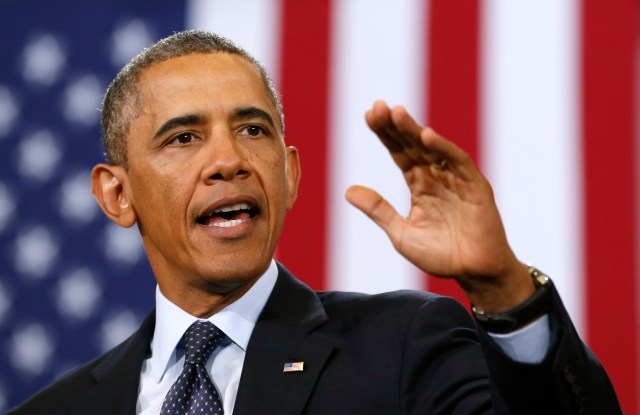
The President’s words won’t act as legislation; they aren’t connected to any federal legislation banning the practice, and it doesn’t seem like the administration will recommend that, choosing instead to support individual states in pursuing legislation to that effect. (18 states introduced legislation meant to address conversion therapy this year.)
Conversion therapy and the junk science behind it have been a horrific spectre haunting LGBT people for generations now. While Obama’s statement functions more as a powerful PSA than a real solution, it’s still a meaningful one, and significant to see the president actively speaking out about LGBT issues besides marriage equality, and acknowledging the tragedy of the epidemic of trans suicide.
+ On Saturday, Walter Scott was murdered by police officer Michael Slager; the video of the altercation, in which Slager shoots a fleeing unarmed Scott eight times in the back and then handcuffs him without offering any medical assistance, has been circulated widely.
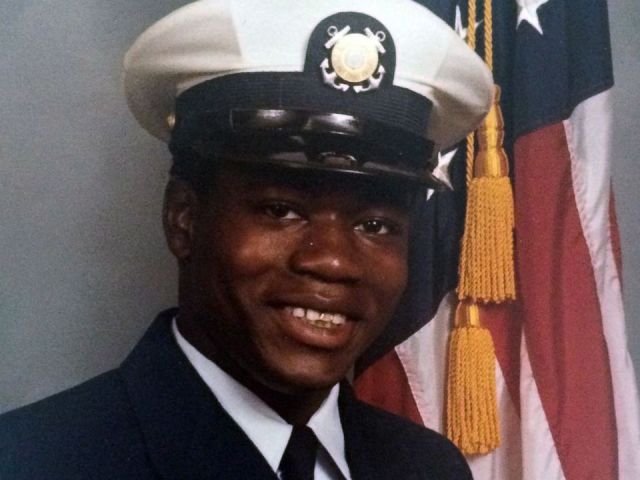
Walter Scott
As of Tuesday, Slager has been charged with murder, although it seems unlikely that Slager would have been charged with anything without video evidence from an anonymous bystander. At Salon, Brittney Cooper asks why we need videotaped footage of murder to believe that it’s happening, and why Black people have to be subjected to publicized images of systemic violence against their own community if they want to see any semblance of justice.
“On Sept. 11, 2001, parents called into news stations around the country to ask them to stop re-airing footage of the planes crashing into the Twin Towers. News stations complied. Yet Black children got up and went to school this morning, and went to bed last night with video of a white police officer callously killing a Black man running on loop. What about our children? What about their sense of safety? Let me count the ways that seeing the police murder of Black people erodes their fragile sense of security. Who should they turn to when they are in danger?
Police officers (of all races and genders) routinely act with excessive force and callous disregard toward Black people. But Black people’s witness of racial atrocity is never believed on its own merits. Instead, white people need to be able to pull up a chair and watch the lynchings take place over and over again, to DVR them, fast forward and rewind through them, to smother Black pain and outrage and fear in an avalanche of cold, ‘rational’ analysis. Meanwhile, minds rarely change.”
Laws & Order
+ The New Yorker has a breakdown of the coming SCOTUS gay marriage ruling, arguments for which will begin on Tuesday, April 28th. If you want to hear about the lineup of litigators for this once-in-a-lifetime event, this is your rundown.
+ Kansas has become the first state in the US to ban dilation & evacuation procedures, meaning that they have effectively banned second-trimester abortion. The language of the bill specifically precludes exceptions for mental health reasons, and has “a fairly narrow definition of what a “medical emergency” could be that would make the procedure legal.” The law decreases the size of the available window of time to get an abortion once someone realizes they’re pregnant, which decreases the amount of time a pregnant person has to find the resources and access necessary to receive an abortion if they need one. Neat! Some abortion access supporters believe this law may be vulnerable to a lawsuit; hopefully they’re right.
Well That Sucks
+ Tyler McCubbin of Iowa says that he was offered a full-time teaching position at Dowling Catholic High School — until the president found out he was gay.
“Bishop Richard Pates is the leader of the Des Moines Diocese. He said that McCubbin wasn’t denied the job because he’s gay, but due to the openness of his sexual orientation. ‘We accept everybody, we love everybody. Everybody is always welcome within the context of the Catholic Church,’ Pates said. As a private school, Dowling said it has a legal right to make hires based on what is in line with the Catholic Church’s doctrine.”
The job denial is even more confusing given that McCubbin is already a substitute teacher and volunteer track coach at Dowling, making it seem as though what the diocese mostly objects to is gay people having a full-time salary and benefits.
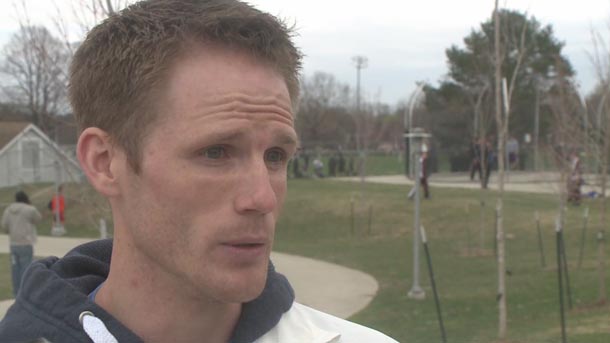
Yesterday, students and alumni of Dowling staged a walkout in McCubbin’s support.
“‘Our community should know that we care and that the choices of our school leaders and our diocese leaders don’t directly reflect what we believe as students and it just makes me so happy that we can show our community that,’ said Grace Mumm, a sophomore who helped organize the walkout.”
+ An educator at the University of Wisconsin-Milwaukee offered his class a small amount of extra credit for participating in a survey, and is now being accused of discrimination because the survey was specifically asking for bisexual respondents. “The leader of UWM’s Young Americans for Liberty, a group for conservatives, told the site such discrimination is a common practice of the ‘left’ and called the extra credit assignment ‘disgusting.'”
+ A jury in Atlanta has convicted 11 teachers and administrators in a largely Black school system of racketeering (a term usually reserved for activities related to organized crime, like money laundering or extortion). Brittney Cooper, who’s really batting a thousand in this particular news fix, has some smart words on why this is less about crime and more about who to blame for the failure of public education’s ideals.
“Scapegoating Black teachers for failing in a system that is designed for Black children, in particular, not to succeed is the real corruption here. Since the early 1990s, we have watched the deprofessionalization of teaching, achieved through the proliferation of ‘teacher fellow’ programs and the massive conservative-led effort to defund public education in major urban areas throughout the country. There is no longer a consensus that a good public education — a hallmark of American democracy — should be considered a public good.”
Good News!
+ Hey remember Claudetteia Love, who wasn’t going to be allowed to wear a tuxedo to her prom? Good news! Now she is. Claudettia says:
“I am thankful that my school is allowing me to be who I am and attend my senior prom in tuxedo. Now that I can go in my tuxedo, I am looking forward to celebrating the end of my senior year with my friends and classmates at the prom, like any other student. The outpouring of support has been incredible and inspiring; it is a source of strength that I will keep with me as I move on the next phase of my education and life beyond high school.”
State of the Union 2015: Instagram, LGBT Shoutout, and a Dysfunctional Tight-Knit Family
Last night President Obama addressed the nation on a number of pressing issues ranging from Instagram to middle-class economics to the fact that climate change exists. The full transcript is available here, and if you’re interested in facial comparisons of Biden and Boehner, you can watch the whole thing as well.
Here’s a quick breakdown of some of the major points discussed. It doesn’t include all of them, because our time here on earth is limited, but it’s a lot of them.
Issues Obama Plans to Take Action On
Free community college
This had already been announced, but he brought it up again in this speech: the president wants to provide two years of community college to every citizen for free, so that “two years of college becomes as free and universal in America as high school is today.” The idea here is that this will make Americans more qualified for the workforce, since an increasing number of jobs require some higher education.
More childcare options made more affordable
Obama described childcare as a “national economic priority” and “not a side issue or women’s issue,” which many were thrilled to hear. Specifically, he wants to create “more slots” for childcare and create a new tax cut for families of “up to $3000 per child per year” as a way to make childcare for working parents more accessible.
Paid leave laws
The president pointed out how much more reasonable other countries’ workplace policies are, with their inclusion of paid sick leave and paid maternity leave, which help keep parents in the workforce and make sure families can eat even if the wage earner comes down with the flu. Obama says he’s going to be “taking new action to help states adopt paid leave laws of their own” — so, encouraging state governments to pass this legislation. He also indicated interest in “putting it to a vote here in Washington,” which would be a way of creating federal legislation that granted paid leave nationwide, but with the current climate in Congress it’s not clear how realistic that is (more on that soon!).
Equal pay and minimum wage
Obama explicitly asked Congress to pass a law “that makes sure a woman is paid the same as a man for doing the same work.” If you’re wondering “doesn’t that law already exist? Didn’t I see a picture of Obama signing a bill with Lilly Ledbetter standing next to him?” the answer is “kinda.” The Fair Pay Act of 2009, the first bill that Obama signed into law as president, does address the pay discrimination suit Ledbetter v. Goodyear Tire & Rubber Co. But it doesn’t guarantee equal pay; it address the statute of limitations on suing for pay discrimination (Ledbetter lost her suit because the court ruled that too much time had passed since the pay discrimination occurred). So, a federal law that successfully provides equal pay for women still doesn’t exist, but Obama would like it to. (The Equal Pay Act, originally passed in 1963, does exist, but hasn’t been entirely effective; in fact, up until 1972, it didn’t even cover “executives, administrators, outside salespeople, and professionals.”)
Obama also addressed the minimum wage, and while he didn’t directly say “we should raise the federal minimum wage,” he said “nothing helps families make ends meet like higher wages” and also delivered this zinger:
And to everyone in this Congress who still refuses to raise the minimum wage, I say this: If you truly believe you could work full-time and support a family on less than $15,000 a year, go try it. If not, vote to give millions of the hardest-working people in America a raise.
“Bipartisan infrastructure plans”
As part of his mission to make sure America stays economically competitive and to make outsourcing jobs unnecessary, Obama wants to “pass a bipartisan infrastructure plan that could create more than thirty times as many jobs per year.” What’s an infrastructure plan? He didn’t go into a lot of detail, but did mention “modern ports, stronger bridges, faster trains and the fastest internet.”
Trade promotion authority
Obama wants to be granted trade promotion authority to oversee “strong new trade deals from Asia to Europe.” What does that mean? Also called “fast track negotiating authority,” this basically means Obama is asking Congress to grant him temporary power to broker international agreements that Congress can’t filibuster or amend (although they can choose to approve or disapprove them). The Obama administration has been trying to have this power granted to it since 2012. It’s a controversial power, and a bit alarming.
Precision Medicine Initiative
The president announced he was launching a “Precision Medicine Initiative,” which he said would “bring us closer to curing diseases like cancer and diabetes — and… give all of us access to the personalized information we need to keep ourselves and our families healthier.” How will that work? There’s some helpful explanation of it here, but basically the deal is that studying genetics has made it possible for us to identify not just a disease, but the specific molecular foundation of the disease, which varies from person to person. Within the group of people who have a certain disease, a certain percentage of them might have one genetic subtype of that disease — the disease can be traced back to a certain molecular configuration — and a certain percentage might have a different subtype. Medicine designed for the overall disease might not be effective for every genetic subtype, so precision medicine can create more targeted treatments that are specific to genetic subtype and are much more effective.
Internet and Space Travel
Obama indicated that he intends to “protect a free and open internet,” which seems like a reference to Net Neutrality. A few moments later, he threw out a medley of space travel related things which were, frankly, totally bonkers. First, he brought up “pushing out into the Solar System not just to visit, but to stay” as the kind of scientific progress he’d like to see America making; second, he casually mentioned a “re-energized” space program that’s planning on sending astronauts to Mars. If you were at this point thinking “didn’t we shut down our space program?” the answer is yes, we ended the NASA Space Shuttle program in 2011. I don’t know how we transitioned from that to a Mars mission. Obama also namedropped Scott Kelly, an astronaut who is going to “begin a year-long stay in space,” a terrifying and suspect concept for anyone who has ever been snowed into their house for 2+ days or seen the movie Moon.
Tax reform
In a nod to the 99% and how fucked our tax system is, Obama convivially suggested “let’s close loopholes that perpetuate wealth inequality.” There is virtually zero chance this will occur.
Climate change
Obama took what is (upsettingly) to some a controversial stance, and reminded the audience that science has pretty clearly demonstrated that climate change is real. He reiterated America’s commitment to enacting policies that will alleviate climate change, and even said “I will not let this Congress endanger the health of our children by turning back the clock on our efforts,” which is pretty direct.
Authorization to use military force against ISIS
After spending much of his speech congratulating his administration for de-escalating America’s military involvement overseas, Obama said he doesn’t want to get involved in “another ground war in the Middle East” but does want Congress to pass a resolution that will authorize the use of force against terrorist group ISIS. Congress is significantly more likely to be interested in this than closing tax loopholes.
Closing Guantanamo Bay
Obama declared he wants to “finish the job” as far as shutting down Gitmo, as part of America’s “profound commitment to justice.” There was no mention of force-feeding or other cruel or inhumane practices there.
Wow! Obama is really making moves his last two years, huh? Honestly, probably not. As you may remember from Schoolhouse Rock, the system of checks and balances means that the President can almost never accomplish anything on his own; he usually needs to get Congress on board with it, too. Since Congress is Republican right now — and has demonstrated an unprecedented overall reluctance to cooperate with the president on anything at all, ever — it’s unlikely that much of what was discussed here will ever become a reality. Pay attention to the phrasing Obama uses for each proposal — the things that are prefaced with “I urge Congress to” or “I will work with Congress to” are probably doomed. There are a few things — the yearlong space trip, the Precision Medicine Initiative — that appear to be already rolling, but for much of the rest of this, we’ll have to wait and see what actually happens.
Things Obama Talked About but Isn’t Taking Action On
As you’ve likely already heard, Obama became the first president ever to say “lesbian, gay, bisexual and transgender.” Which is historic! It’s important to note, however, that he’s not introducing any new policies or proposing any legislation related to the protection or support of those groups. He did mention marriage equality, but less as a call to action and more of a suggestion that it’s something we’ve already succeeded in obtaining: “I’ve seen something like gay marriage go from a wedge issue used to drive us apart to a story of freedom across our country, a civil right now legal in states that seven in ten Americans call home.”
Obama also mentioned Ferguson and New York (it’s still not totally clear to me whether “New York” was a reference to Eric Garner or to Rafael Ramos and Wenjian Liu), but not in any way that suggested that any of those events represented a need for change to the justice system.
We may have different takes on the events of Ferguson and New York. But surely we can understand a father who fears his son can’t walk home without being harassed. Surely we can understand the wife who won’t rest until the police officer she married walks through the front door at the end of his shift. Surely we can agree it’s a good thing that for the first time in 40 years, the crime rate and the incarceration rate have come down together, and use that as a starting point for Democrats and Republicans, community leaders and law enforcement, to reform America’s criminal justice system so that it protects and serves us all.
This mention came during the portion of the speech Obama had dedicated to “rebuilding trust” and emphasizing shared values over difference; in this context, it appears that not only did Obama not propose any action on this, but seems to be suggesting that we not ask for any. There isn’t even a broad recommendation being made, like Attorney General Holder did recently when he suggested that greater transparency about police deaths is needed. None of the names of those killed by police this year were mentioned.
He also made this statement, clearly referencing the language of the #BlackLivesMatter movement but avoiding the reality that it’s Black children, not every child, who are usually in danger:
I want our actions to tell every child, in every neighborhood: your life matters, and we are as committed to improving your life chances as we are for our own kids.
Obama also mentioned abortion and reproductive rights, but once again did so in a fashion that downplayed the reality of conflict around it rather than addressing it:
We still may not agree on a woman’s right to choose, but surely we can agree it’s a good thing that teen pregnancies and abortions are nearing all-time lows, and that every woman should have access to the health care she needs.
Similarly, he brought up immigration without specifically discussing what its future might be:
Yes, passions still fly on immigration, but surely we can all see something of ourselves in the striving young student, and agree that no one benefits when a hardworking mom is taken from her child, and that it’s possible to shape a law that upholds our tradition as a nation of laws and a nation of immigrants.
Overall…
Much of the buzz about this year’s state of the union had to do with bipartisanship and the idea of an “olive branch” — could Obama build any goodwill with Republicans that might lead to getting something done in the two years he has left in office? The content of the speech is clearly reaching for this, with multiple references to what a “tight-knit family” America is, and calling for cooperation:
“If you share the broad vision I outlined tonight, join me in the work at hand. If you disagree with parts of it, I hope you’ll at least work with me where you do agree. And I commit to every Republican here tonight that I will not only seek out your ideas, I will seek to work with you to make this country stronger.”
If you were tracking Boehner’s facial expressions throughout the speech, you may not feel very hopeful about this bipartisan dream. We’ll see what 2015 brings us in terms of cooperation across the aisle.
It’s On Us: Obama’s New Campaign Says Everyone Is Responsible for Helping End Campus Sexual Assault
Barack Obama, the President who has already made history for speaking out against and speaking up for action on sexual assault, asking men to be “part of the solution,” announced today that there’s more. The White House and Generation Progress, in conjunction with some big-name partners ranging from organizations to corporations to sports teams to universities, have launched It’s On Us, a high-tech, multi-platform media campaign targeted at ending campus sexual assault. President Obama and Vice President Biden announced the initiative to a room of activists and advocates today, including feminist allies from Congress and survivors who spoke about their experience.
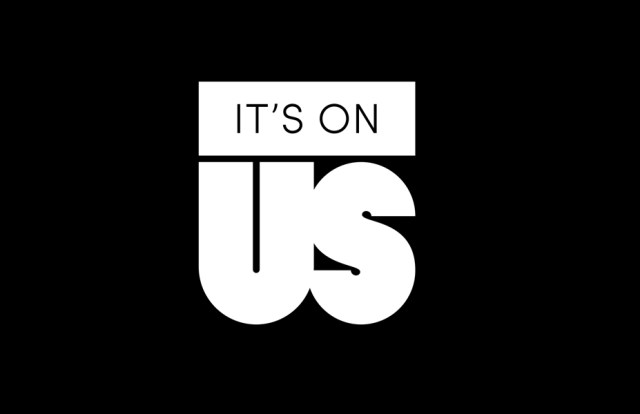
The campaign, which builds on the findings of the White House Task Force on Sexual Assault’s first report, “Not Alone,” calls on young people to commit to being agents of change in their communities. The goal? For people everywhere — including and especially men — to come together and demand an end to sexual violence. “It’s On Us is a cultural movement aimed at fundamentally shifting the way we think about sexual assault,” reads the campaign mission statement. “It’s On Us is a rallying cry inviting everyone to step up and realize that the solution begins with us.”
The entire campaign is structured around the idea that every single person is accountable for our rape culture. Bystander intervention is a big focus, which is a practice hailed by advocates for being key in shifting social norms around sexual violence. By targeting men and endowing individual people with a sense of accountability and responsibility for preventing violence in their communities, the campaign is strategically working to dismantle rape culture, rather than just working to put a band-aid on its consequences.
“Changing our culture. That’s what prevention is going to require,” Obama said at the campaign launch. “We’ve got to have a fundamental shift in our culture… [Laws] won’t won’t be enough unless we change the culture that allows assault to happen in the first place.”
That’s huge.
1 in 5 women will be raped or sexually assaulted at college. For too long, fixing the campus sexual assault epidemic is a crisis that’s been laid on the shoulders of survivors and student activists, many of whom have been met with hesitancy, dismissal, and rejection from administrators for attempting to pursue justice or common-sense reform. Dozens of schools are under federal investigation for mishandling sexual assault cases, and dozens more are probably doing just as poorly at taking care of their students.
“Every one of these statistics is a life,” Vice President Biden remarked today. “It’s no doubt that colleges and universities need to step up their game.”
It’s On Us isn’t meant to detract from the importance of those federal lawsuits or the need for greater policy change and legislative action on campus sexual assault — it’s meant to build on it. And the campaign isn’t meant to replace the fiery student activism taking the world by storm — it’s meant to institutionalize it. Despite the efforts of activists across the nation, it’s clear that until sexual assault is taken seriously by everyone — and not just the folks who live in fear of it every day — widespread cultural change will not come. It’s On Us could potentially fill the gap between activists and their administrations, creating cultural demand for the work they’ve been pioneering for years.
This isn’t the President’s first attempt to bring men into the movement to end sexual violence. Obama’s historic White House Task Force on Sexual Assault pledged in April to work closely with colleges and universities in order to gauge the actual prevalence of rape and sexual assault happening on campuses nationwide and laid down a lot of suggestions for administrators looking to implement successful primary prevention programs. Alongside that report, the task force also launched NotAlone.Gov, a portal where survivors of campus sexual assault can find information on reporting, locate support services in their area, and the federal investigations happening on their campuses. The White House’s 1 is 2 Many campaign specifically targeted men in the fight to end sexual assault, urging them to “be part of the solution,” not the problem. Since their election, President Obama and Vice President Biden have repeatedly spoken out about their commitment to ending sexual violence, and they’ve acted on those words by supporting comprehensive legislation like the Violence Against Women Act, inviting sexual assault advocates and activists to the White House, and using the Office of Public Engagement for the greater good in producing these campaigns.
It’s On Us is one more important step to ending campus sexual assault. President Obama and Vice President Biden have shown that they have a real dedication to this issue, and by working with Generation Progress and feminist non-profits like the Feminist Majority Foundation and the American Association for University Women, they’ve shown consideration for the real needs of college women and respect for the work anti-violence activists have been doing. Now, partnerships with sports teams, corporations, and university administrations have given those activists a massive platform and support network for getting more results.
“Everybody has a role to play,” Obama added when closing his speech today. “I’m asking all of you to join us in this campaign… Commit to being a part of the solution.”
The President’s right: it’s on us. So take a minute today to sign the pledge, commit your entire social media presence to the campaign, or download the toolkit and hit the ground running. Don’t worry – the White House has got your back.
Wait What Is Even Happening With the Affordable Care Act: A Tale of Two Rulings
The DC Court of Appeals and the 4th Circuit Court of Appeals both handed down rulings on health care subsidies yesterday with totally conflicting opinions. The 4th Circuit Court of Appeals ruled unanimously in King v. Burwell that health care subsidies should be available to all who have purchased insurance on the health care exchange, as the IRS is currently providing. The DC Court of Appeals ruled 2-1 in Halbig v. Burwell that health care subsidies should only be available to those who have purchased their plan through state exchanges and that the IRS illegally extended subsidies to those who purchased their plan through the federally run exchanges.
What does this mean for the 8 million people who have purchased healthcare coverage through the exchanges set up under the Affordable Care Act? If the DC Court of Appeals’ argument is upheld, individuals who purchased their plan through the federally run exchange will lose access to affordable health care. Because the courts came down with different rulings, this may put the issue on the fast track to a Supreme Court hearing. For now, the U.S. government is appealing the DC Court of Appeals decision to the entire 11-person appeals court. Judge Harry T. Edwards, the one dissenting vote in the D.C. case, called the ruling a “not-so-veiled attempt to gut the Patient Protection and Affordable Care Act.”
You may remember that, as of this year, all folks in the U.S. have to have health care coverage or be charged a penalty, a key provision of the ACA that was upheld by the Supreme Court in 2012. However, if an individual or family’s health care costs exceed 8% of their income, they are exempt from the fee. If the D.C. decision is upheld, it creates a loophole through which people who are currently uninsured will remain uninsured because their health care costs will skyrocket to the point that they can no longer afford them.
People in 36 states would affected by the DC ruling because their state either did not set up their own exchange or partially relies on the federal exchange. This would yank out the heart of the ACA and undo the years of tireless work that have gone into giving more folks access to affordable health care.
According to federal statistics from HHS, the average post-subsidy premium for folks enrolled in the federal exchange is 76% less than the full premium. To put that in numbers, a premium of $346/month would only cost $82/month due to subsidies. If the DC ruling becomes the law of the land, the entire $346 premium would be paid by the subscriber. Obviously, for individuals and families who are already living close to their means, this would be impossible to afford. Many would end up going without insurance coverage, as they have for months, years, lifetimes, or generations.
As ya’ll know, this would disproportionately affect lots of folks who disproportionately lack access to health care, including LGBT people. I don’t have to tell you how shitty health disparities for LGBT people are. The ACA was kind of awesome for LGBT people. It established that being transgender could not be used as a pre-existing condition to deny coverage and that transgender people would be guaranteed coverage regardless of gender identity or expression. It also explicitly included non-discrimination language that protected LGB individuals, LGBT married couples, and LGBT families with kids. According to the Center for American Progress, more than 500,000 LGBT people are eligible for health care subsidies through the federal exchange across the U.S.
Who else will be affected? If you said people of color, women, and young people, you’d be right! According to the HHS, of the more tan 8 million people who have enrolled in the health care exchanges:
- 54% are female,
- 34% are under age thirty-five,
- 37% are people of color.
The ACA may not be perfect, but it is giving millions of people access to health care security and putting the brakes on out-of-control health care costs and discriminatory policies. White House press spokesperson, Josh Earnest, announced at a press conference that they are “confident in their legal position… rooted in the fact that it is pretty obvious [Congress’s] intent was for every eligible American who applied for tax credits to make their health care more affordable to have access to those tax credits.” Let’s hope he’s right. For the sake of all our communities and families, this core piece of the ACA must be preserved.
Obama Closes Out Pride Month By Extending Workplace Protections to Transgender Federal Employees
As a part of the White House’s Pride Month Celebration on Monday, President Barack Obama announced that he would be signing an executive order that would grant workplace protections to federal employees based on their gender identity. This comes a few weeks after he announced another executive order banning federal contractors from discriminating based on sexual orientation or gender identity. Together, these two executive orders bring some much-needed protections to one of the most discriminated against groups when it comes to hiring practices and workplace behavior.
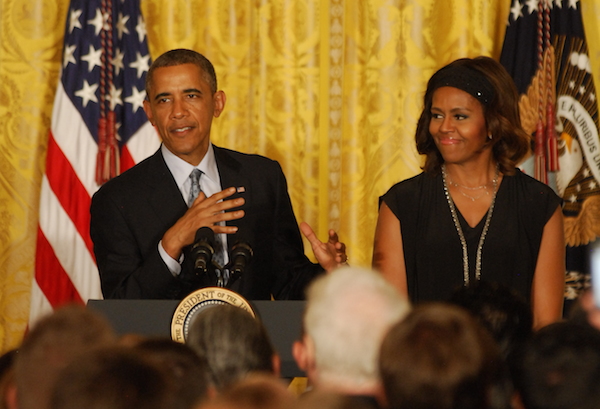
The Obamas speaking during the White House’s Pride Celebration. via Metro Weekly
President Obama’s previously announced executive order covers all employees of federal contractors, which accounts for more than 20% of the American workforce. According to the Williams Institute, this means that 11 million workers received new sexual orientation protections and 16.5 million workers received new gender identity protections. Many companies that had previously resisted granting gender and sexuality protections risk losing government contracts if they don’t now offer those protections. One major example, according to Freedom to Work president Tico Almeida, is ExxonMobil, “who have fought against LGBT protections for years [and] will finally have to reconsider their retrograde position if they want to continue profiting from hundreds of millions of dollars in taxpayer-funded contracts.”
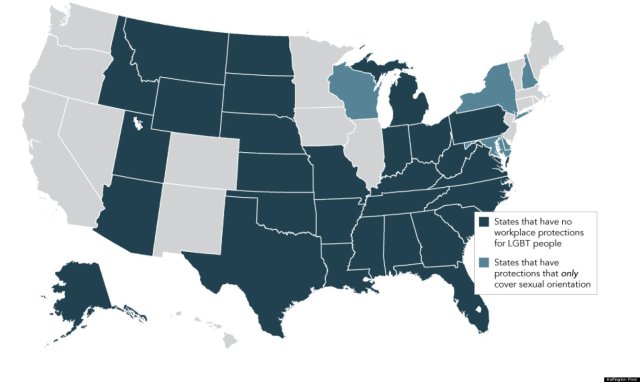
Information as of November, 2013 via Huffington Post
Now, President Obama is extending a 2009 memorandum he issued that gave protections and benefits to gay, lesbian and bisexual federal employees to transgender and gender non-conforming employees. He said that since the Employee Non-Discrimination Act has stalled in Congress, he feels like he needs to step forward and take some action.
I’ve repeatedly called on Congress to pass the Employment Non-Discrimination Act. Right now, there are more states that let same-sex couples get married than there are states who prohibit discrimination against their LGBT workers. We have laws that say Americans can’t be fired on the basis of the color of their skin or their religion, or because they have a disability. But every day, millions of Americans go to work worried that they could lose their job – not because of anything they’ve done… but because of who they are. It’s upsetting. It is wrong.
The majority of Fortune 500 companies already have nondiscrimination policies to protect their employees because it’s the right thing to do and because many say it helps to retain and attract the best talent. And I agree. So if Congress won’t act, I will. I have directed my staff to prepare an executive order for my signature that prohibits discrimination by federal contractors on the basis of sexual orientation and gender identity.
And I’ve asked my staff to prepare a second executive order so that federal employees – who are already protected on the basis of sexual orientation – will now formally be protected from discrimination based on gender identity as well.
Transgender people, and especially trans women and trans women of color, face alarming rates of workplace discrimination in the US. According to a 2011 report, transgender people face double the unemployment rate of the general population. That number jumps to four times the national unemployment rate for trans people of color. When it comes to the living in poverty, transgender people are almost four times as likely as the general population to make less than $10,000 a year. Finally, a whopping 90% of trans people surveyed said that they were harassed or mistreated at work and 47% reported that they had been fired, not hired or denied a promotion because of their gender. With numbers like these, trans people need all the protections they can get, and since there is no federal law protecting trans people from workplace discrimination, this announcement has many transgender workers breathing a sigh of relief.
On a day where we got some seriously awful news out of Washington, DC, it’s nice to see that there’s at least some good that can come out of national politics. Both of these executive orders are definitely positive steps forward. Not only do they put serious pressure on both the government and companies who have federal contracts to treat their employees fairly, but it also puts pressure on Congress to finally pass a federal law to put these protections on the books.
Obama Will Finally Sign Executive Order for LGBT Workplace Protection, ENDA Still Nowhere in Sight
Despite the Obama administration’s general trend of ‘evolution’ on LGBT issues — the repeal of DOMA, Obama’s support of marriage equality, inclusivity for trans students under Title IX, Medicare’s coverage of gender confirmation surgery — there’s always been one issue they’ve refused to move on. For several years, there’s been pressure on the White House to sign an executive order for LGBT workplace protection, which would prohibit federal contractors from discriminating on the basis of sexual orientation and gender identity. Now, Buzzfeed reports that the White House will announce today that the executive order is finally coming; although the official announcement hasn’t been made, a White House official has spoken to members of the press. Obama has claimed in the past that the administration would prefer to accomplish workplace protections by passing ENDA than by signing an executive order, but it seems the fact that ENDA is likely to stall out again this year has forced the administration’s hand.
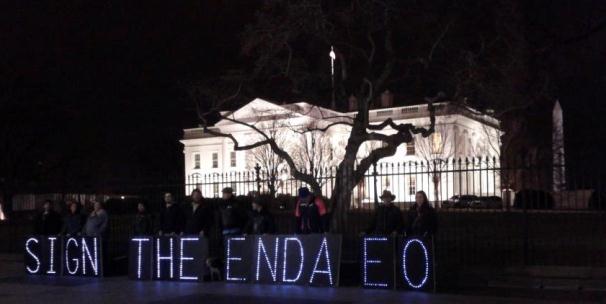
As a presidential candidate in 2008, Obama filled out a presidential candidate questionnaire in which he indicated that he would “support a nondiscrimination policy that includes sexual orientation and gender identity for federal contractors.” The administration has so far avoided using an executive order to make that ideal a reality, but perhaps in response to how stalwart the House of Representatives has remained as far as blocking Obama’s policy plans, he’s become more willing in recent months to use executive powers to effect change. An unnamed White House official speaking to Metro Weekly confirms that the LGBT nondiscrimination order is part of this new legislative approach.
“The President has declared 2014 a year of action – vowing to use the power of his pen and phone to take action on behalf of the American people to strengthen the economy and the middle class… His actions have been driven by the core American principle that if you work hard and play by the rules, you should have the opportunity to succeed, and that your ability to get ahead should be determined by your hard work, ambition, and goals – not by the circumstances of your birth, your sexual orientation or gender identity.”
Workplace protections are a crucial concern for many LGBT Americans, especially in the current economic climate. Workplace concerns are especially critical for LGBT workers of color, who face intense challenges when entering and then thriving in the workplace. This executive order won’t necessarily make a difference for the average LGBT employee; it only applies to federal contractors, and doesn’t change state legislation or affect private employers. It doesn’t change the fact that there are still states where it’s perfectly legal to fire or refuse to hire someone based on their LGBT identity. The hope is that, much like DOMA’s repeal providing a nudge to states where a repeal of a same-sex marriage ban was on the table, prioritizing LGBT workplace protection at the federal level will provide an example that might be imitated elsewhere in the legislature.
Obama is scheduled to attend the Democratic National Committee’s LGBT gala tomorrow, and the White House’s annual LGBT Pride Month reception at the end of June; although the official announcement still hasn’t been made, it seems likely that Obama will address the executive order publicly soon.
Women of Soul Invade White House, Your Television
feature image via AP
After 200+ years of running the American government via several committees of boring old white guys, the Obama administration has finally figured out how to govern this country in a way that makes sense for everybody. On March 6, the White House celebrated Women’s History Month by hosting Aretha Franklin, Janelle Monáe, Patti LaBelle, Melissa Etheridge, Jill Scott, Ariana Grande and Tessanne Chin for a concert intended to celebrate the struggles, achievements and contributions made by women in music. Earlier in the day, First Lady Michelle Obama hosted “I’m Every Woman: The History of Women in Soul,” an interactive workshop for 124 middle school, high school and college students. Participants gathered in the State Dining Room to meet with Robert Santelli, Executive Director of The GRAMMY Museum in Los Angeles and several of the performers to discuss the social and political climates of America that led to the advent of soul music, and its impact on the world. Michelle Obama described soul as “the kind of music that makes you move, no matter who you are or where you come from.”
Describing the inspiring works of Patti LaBelle, the first lady added: “Find your own voice and be proud of it. And then, sing your butt off. Or work your butt off. Or whatever you do, do it until your butt comes off. OK, that quote is going to be kind of funny in the papers. I already know it. My communications people are like, what?! But you guys all know what I meant – be good at what you do.”
As for the performance itself, President Obama was pretty excited about it, possibly so excited that he forgot how to spell “respect.”
The concert began with Patti LaBelle performing “Over the Rainbow,” and climaxed with Melissa Etheridge, Janelle Monáe, Jill Scott and Tessanne Chin coming together for a gorgeous, triumphant rendition of “Proud Mary.”
For those of us who were not invited, the Women of Soul concert will be screened on PBS on Monday, April 7 at 7PM (check your local listings).
Obama’s State Of The Union Respects Women, Wants You To Have More Money
In his fifth State of the Union address Tuesday night, President Barack Obama set the tone for a year of strength from his office. Executive power, rather than legislative, is clearly the president’s intention for 2014. He told us again and again how he would, wherever possible, bypass the gridlocked Congress to enact change, even delivering a presidential order to raise the minimum wage for federal workers to $10.10. He announced intentions to close the prison at Guantanamo Bay by the end of the year. He called out those (mostly Republican) politicians who made 2013 the year of gridlock, fear and grandstanding, rather than progress and cooperative action he called for in his last SOTU address. He laid out a few key issues he plans to address with or without Congress’s help, including early education, job creation, the gender pay gap and healthcare, promising ” a breakthrough year for America.” You can read the full text of the speech here and watch the video below.
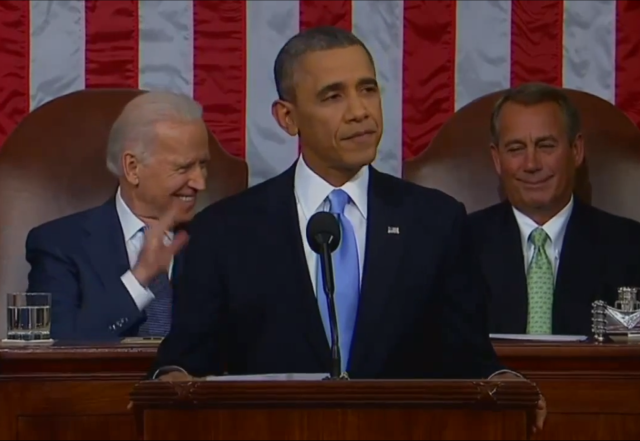
Screenshot via The New York Times video
If all goes according to his plan (and it very well may not) this will be a year of leaps and bounds for many of the Americans who felt left behind in 2013. Women, people of color and those living in poverty all received direct attention in this speech, to name a few. The president specifically called out income inequality, following through on an earlier executive order to change the minimum wage for federal workers to $10.10 and calling on Congress to work with Democratic senators’ plan to set the nationwide minimum to the same amount. That Senate proposal, by the way, would lift millions of Americans out of poverty. Obama also called for the reinstatement of unemployment insurance benefits that expired last month, leaving families whose members lose their jobs suddenly without one of the best proven lifelines. He announced a new plan to help Americans create public retirement savings accounts that could help ease the retirement crisis. “The cold, hard fact is that even in the midst of recovery, too many Americans are working more than ever just to get by – let alone get ahead,” he said. To help us get ahead, he’s pledged to give us whatever tools are possible without legislative action.
Women were a huge focus of the night, from discussions of healthcare to workplace inequality to business growth. Early education, technology innovation, booming industry, medical insurance — they pretty much all came back to women who, whether they work or raise families or devote themselves to something else altogether, deserve to be backed by the rest of the nation. He featured as many female guests as males among his personal anecdotes, and even generic examples of progress like referencing “an entrepreneur [who] flipped on the lights in her tech startup” emphasized female strength throughout the country. And given recent confusion over what we mean when we talk about the “war on women,” the president’s insistence that women are people fully deserving of the same opportunities as men was a good reminder that not all our politicians are against us. It shouldn’t be a bold move, but it certainly felt like one.

Image via ThinkProgress
As for healthcare, Obama’s biggest political effort so far was an opportunity both to chide his opponents for attempting dozens of repeals of the act and to plug the fledgling system with the group he thinks most likely to use it: young Americans. “Kids, call your mom and walk her through the application,” he said. “It will give her some peace of mind – plus, she’ll appreciate hearing from you.” The battle over Obamacare is not over, but maybe some politicians will follow in the president’s example in focusing on actionable issues with the system, like the website or confusion over keeping existing plans, rather than trying to repeal the law for the 41st time.
There was one thing that bothered me throughout the address and continues to irk me now as I look back at the transcript. So many of the important issues Obama called out, including gender, immigration, unemployment and healthcare, intersect with queerness in very powerful ways. We’ve written about how workplace discrimination, joblessness, homelessness, violence and more hit LGBTQ Americans, who often the lack familial support or monetary resources to get by until their luck changes, particularly hard. Recognition of that fact by the president of our nation, particularly in the speech meant to set the coming year’s priorities, would have leant so much heft to efforts to combat those issues. Even a celebration of the year’s various victories, like the gutting of the Defense of Marriage Act, the death of California’s Prop 8, the securing of marriage equality in seven new states and unprecedented progress for a more inclusive Employment Nondiscrimination Act, would have been an appreciated nod to the particular struggles of a subset of Americans. It would have cemented the support he’s verbalized on many previous occasions.
As in all things, however, we must look not only at what has been said, but also at what may be done. After a year of frustration, it was refreshing to see the president reminding us what he could do without our ever-gridlocked legislative bodies. He actually looked fresher and more energetic than he did during much of what has been called the weakest year of his presidency. He made promises to combat inequality by improving the resources available to those at the bottom of the wealth ladder, even if those at the top refuse to relinquish their surplus. He reminded us again and again that women aren’t just a subset of American society but rather a central component of it. He reaffirmed his promise to military families that he wouldn’t send their soldier out to fight in any more never-ending wars. He called on the nation’s leaders to set aside endless partisan battles and “say what we’re for, not just what we’re against.” If the president is able to do even half of the things he has promised, we’ll be a great deal further along in the right direction.
https://www.youtube.com/watch?v=hed1nP9X7pI&
It’s A Brave New World of Obamacare, Here’s How To Live In It
by Cara and Rachel
There’s been so much discussion about the battle to get the Affordable Care Act passed you may have let your focus slip from what the ACA is actually for — trying to make it easier for people (like you!) to access healthcare. The ACA, aka “Obamacare,” isn’t a health care plan in itself — it’s a set of laws that requires almost every citizen to have a health plan (or pay a penalty), and standardizes the process for getting one. It also sets minimum standards for those health plans, offers subsidies that will help a lot of people better afford insurance, and changes some eligibility requirements for federally funded programs like Medicaid. As the deadline for January coverage approaches (it’s December 23rd!), here’s a guide to what the ACA actually means for you, and what you have to do to get in on it. First, let’s quickly run through some of the questions you might have.

I don’t have health insurance. Can I just keep not having health insurance?
Probably not. There are a few situations in which you aren’t required to have insurance, but part of the ACA is that everyone is supposed to have to have insurance for real now. Or, more accurately, you don’t have to have it, but you’ll have to pay a penalty if you don’t, so.
I do have health insurance. Do I have to change anything about it or switch to Obamacare?
If you already have insurance, you’re probably good to go! It’s worth checking out whether anything about your situation has changed — if the plan you already have has been updated, whether Obamacare might be cheaper for you, whether you might be newly eligible for Medicaid — but there’s no requirement to have Obamacare specifically, just health insurance, any health insurance.
I’m still on my parent’s insurance because I’m young enough to qualify. Can I stay on it?
Sure! You’re golden.
I’m turning 26 and won’t be able to stay on my parents’ plan soon. Should I opt for workplace/school insurance or Obamacare? Which will be cheaper/provide better coverage?
Good question! The answer is gonna vary. You’ll need to go to the Health Insurance Marketplace to figure out what options are available to you through the ACA and how those stack up against your other choices. The good news is that the ACA has set new standards for what ALL health plans are required to provide, so it’s possible that if your options for coverage were underwhelming before, they may now be beefed up a little in terms of what they’ll cover. Obamacare does have built into its infrastructure that it tries to provide subsidized plans for people, whereas your employer probably doesn’t, so there’s that.
How much does Obamacare cost?
This is complicated because “Obamacare” isn’t one singular plan; it’s more of a way to encourage and assist people in accessing a variety of different insurance plans. So there’s not one simple answer to this. For many people, Obamacare will be cheaper than other options; for some people, that won’t be the case.
I live in one of the states that opted out of the exchange. Does that mean I can’t get Obamacare?
Nope! You can still sign up for it! Things in your state are gonna be different, though, especially as relates to Medicaid. We’re gonna talk about this more later on, so keep reading.
I keep hearing about Obamacare and abortions and birth control. I don’t really know why. Does Obamacare cover abortions?
Again, this is gonna vary, because Obamacare isn’t one thing but a gateway to many things. You could say it’s one ring to rule them all. (One NuvaRing? I’m sorry.) Obamacare does require all plans to cover preventative care, so birth control, implantable birth control devices, Plan B and more are definitely covered. But Obamacare doesn’t require plans to cover abortion.
I’m trans*. Does Obamacare change anything about healthcare for me?
Possibly! One thing the ACA has done is codify Title VII federal nondiscrimination protections into healthcare, which should ban discrimination based on gender identity and require that your physician treat you with the same respect, dignity and quality of care as a cis patient. (This should also apply to places like rape crisis centers, drug rehab programs, and veterans health centers!) The ACA has also secured funding for cultural competency trainings for healthcare professionals, which means there’s a greater chance your doctor will have a clue about your specific health concerns and experiences. However, the ACA doesn’t require that plans meet any level of coverage for transition-related healthcare, and so it’s still possible for insurance plans to refuse to cover transition-related expenses. For more information, check this out.
Does the Obamacare website even work? Can I use it now?
Yeah, more or less. I mean, it’s not like we have the option to sign up for Obamacare via carrier pigeon or trained capuchin monkey, so you might as well try it. Good luck.
Ok, but how do I actually do all of this stuff? How do I find out if I’m one of the people exempt from the insurance requirement? Do I qualify for Medicaid now? I’m confused. Hold my hand.
YOU ARE IN LUCK. We will now explain all of these things in even greater detail. Check out the next page!
The Out2Enroll Campaign Wants To Help You Get Awesome Health Coverage
(feature image via Shutterstock)
Remember when Obama’s shiny new health care bill, the Patient Protection and Affordable Care Act (ACA), passed way back in March 2010? Good news! The slow government crawl to actual fruition is nearly over, and starting on October 1st, Americans will be able to start shopping for ACA insurance plans which will go into effect next year. Judging by the general complexity of bureaucratic endeavors, and the tiny endlessness of insurance form fine print, the whole process will probably be pretty headache-inducing for everyone. But when you take into account, say, the complex legality of being in a same-sex relationship in certain states, or the hassle of figuring out if your plan covers your hormones, you might get several headaches, which could make you want to visit your doctor, which will make you wish you were insured. Luckily, the Out2Enroll Campaign is here to help!

CONFUSING (VIA SHUTTERSTOCK)
Progressive think tank the Center for American Progress, the Sellers Dorsey Foundation for LGBT health, and the Federal Agencies Project have joined forces to launch Out2Enroll, an initiative designed to help LGBT Americans get the best possible health coverage under new ACA requirements. According to studies by the Center for American Progress, 34% of lower-income LGBT adults are currently uninsured, due to — among other things — workplace discrimination, lack of domestic partner benefits, and specific treatment exclusions. This is especially bad news considering that LGBT people are more likely to suffer from anxiety, depression, and substance abuse; fail to take prescribed medication and to be treated at the emergency room; and that older LGBT people are more likely to be disabled or stressed. Out2Enroll aims to reverse all of these trends by helping as many LGBT people as possible enroll for coverage. In addition to a resource-rich website, which will launch on October 11th, the campaign will spearhead local signup initiatives, staff multi-lingual call centers, and host community forums to answer questions about health care and coverage.
When the Affordable Care Act passed, the National Gay and Lesbian Task Force lauded it as “a historic step forward” for LGBT health in America — among other things, the ACA puts money towards community health centers, outlaws insurer discrimination based on pre-existing conditions, and funds research into LGBT-focused health discrepancies. A few days ago, during a special White House briefing, Senior Advisor Valerie Jarrett and Health and Human Services Secretary Kathleen Sebelius explained some of the ways in which the ACA has benefited and will benefit LGBT people, including requiring hospitals that receive Medicare funding (“and oh, by the way, that’s every hospital in the country”) to extend hospital visitation rights to same-sex couples, prioritizing LGBT youth in foster homes, and collecting data on sexual orientation and gender identity in order to research and fight health disparity. As Jarrett put it, “Being LGBT is no longer a pre-existing condition.” Out2Enroll aims to make this true on an individual basis.
If you’d like to brush up before the site goes live, Out2Enroll has released a preliminary fact sheet outlining what you can expect when signing up for a plan. For a deeper dive, this New York Times chart remains helpful and streamlined, this NPR series remains specific and comprehensive, and these two This American Life podcasts, ‘More is Less‘ and ‘Someone Else’s Money‘, remain educational ways to spend your commute. There’s also the official U.S. government healthcare site, which can tell you what rates you qualify for, as well as the Out2Enroll gateway site, where you can sign up to be alerted when the real site goes live. Start shining those apples!
White House Will Talk About Bisexual Issues For The First Time Ever
In exciting news for bisexuals, pansexuals, queermos and other in-betweenmos all across the USA, White House Public Engagement Advisor/LGBT liasion Gautam Raghavan has announced that on September 23, a roundtable discussion will be held surrounding bisexual issues in America. This meeting will take place behind closed doors in the Eisenhower Executive Office Building of the White House, and Raghavan has written that “participants and administration officials will discuss a range of topics including health, HIV/AIDS, domestic and intimate partner violence, mental health, and bullying.”
Information surrounding the discussion is limited, but Michael Cole-Schwartz, a spokesperson for the Human Rights Campaign has announced that the HRC will be present and participating. He added: “It’s a testament to this administration that they are focusing on all elements of the LGBT community and they should be applauded for hosting an event focused on some of the specific issues impacting bisexual people.”
This discussion will be the first time this administration or frankly any administration has acknowledged the myriad issues affecting bisexual Americans. While it is often assumed that non-monosexuals are easily assimilated into LGBTQ culture and deal with similar struggles, the San Francisco Human Rights Commission’s 2011 report Bisexual Invisibility: Impacts and Recommendations paints a very different picture. According to their research, bisexuals were statistically more likely to suffer from depression, anxiety, hypertension, complications from smoking, alcoholism and other mood or anxiety disorders, and poor health in general. They were also more likely to live in poverty, less likely to have access to health care and quite significantly more likely to commit or seriously consider suicide than their straight, gay or lesbian counterparts. The report attributes many of these findings to non-monosexual individuals feeling invisible or isolated, that their sexual orientation is considered immoral, invalid or “just a phase.”
Earlier this year, the U.S. Center for Disease Control and Prevention found that in a sample group of nearly 1,000 women, 61% of bisexual women reported some incident of rape, physical violence, and/or stalking by an intimate partner, compared with about 43% of lesbian women and 35% of heterosexual women. The research also found that bisexual women were statistically more likely to be raped or subject to unwanted sexual contact regardless of relationship status, and also more likely to report that the incident(s) had affected their lives in a negative way. While this of course does not mean that the stigma and oppression faced by bisexuals are “worse” than that experienced by gays, lesbians or any other group, the data clearly points to the conclusion that the issues experienced by bisexuals are unique and distinct, and that investigating their solutions requires treating them as such.
Oftentimes it’s a challenge for bisexuals to simply have their identities perceived as valid, and our government’s acknowledgement that we are a real community with unique challenges is a huge step towards eradicating that misconception. It seems highly unlikely that this White House conference will immediately impact these very real concerns for the bisexual community, and it doesn’t bode particularly well that the HRC is the only group confirmed to be attending given that the HRC doesn’t have a history of specifically addressing or representing bisexual people or issues. But the fact that a meeting is taking place at all is enormous and exciting progress.
What The Heck Are LGBTs Gonna Do About The Sochi Olympics?
Since the nationwide “Don’t Say Gay” bill passed in June, you can be arrested in Russia for telling a minor that gay people exist, being part of a public LGBT assembly, or for “socially equating traditional and non-traditional sexual relationships.” The new laws are both wide-reaching and scarily vague, and serve to legitimize and institutionalize an existing national attitude towards gay people that positions them as, at best, second-class citizens and, at worst, subhuman (State Broadcasting Director Dmitri Kisilev recently appeared on Russia’s most popular news program saying that gay people’s hearts should be deemed unfit for transplants, to wild applause). Gay parents who can manage it are fleeing the country lest their children be taken away. LGBT teenagers are being abducted and abused by anti-gay extremists, with no reponse from authorities. The rules also apply to foreign tourists, as four Dutch filmmakers found out when they were recently detained and questioned by police.
Interesting timing, considering that Russia is in for a giant influx of foreign tourists in about six months, along with a searing dose of international spotlight. On August 1st, Russian Sports Minister Vitaly Mutko told a state news agency that anyone advocating a “nontraditional sexual orientation” at the 2014 Sochi Winter Olympics will be “held accountable… Even if he’s a sportsman, when he comes to a country, he should respect its laws.” Legislator Vitaly Milonov told the BBC that the Russian government lacks the authority to suspend the laws even if they wanted to. A week later, Mutko, apparently training for the Strategic Backpedaling event, asked the law’s critics to “calm down” and assured everyone that as long as LGBT athletes and spectators keep quiet, everything will be fine, because Russia’s constitution guarantees “rights for the private life and privacy.”

SOCHI’S OLYMPIC PARK, UNDER CONSTRUCTION (VIA THE ATLANTIC)
But promising not to engage in an all-out witch hunt is not the same as actually guaranteeing anyone’s right to self-expression or an honest existence. And even if Olympic participans and visitors are totally safe, these laws will go on making life miserable for millions of Russian citizens long after the stadium is empty. Back in February, Kristen took the LGBT athletic community’s pulse regarding Sochi after a Russian judge pre-emptively banned the Olympic Village Pride House. Now that these laws have passed, the trepidation expressed by these out athletes is finally spreading to the rest of the world. What should we — as individuals, committees, and nations — do about Sochi? What can we do, and what have we done before? Here’s a breakdown of a few options that have been presented, along with how they’ve worked in the past.
Boycott the games entirely
Actor and playwright Harvey Fierstein called for an all-out boycott in a recent New York Times op-ed, drawing a parallel to the 1936 Berlin games and saying that “there is a price for tolerating intolerance.” British comedian Stephen Fry echoed this in an open letter to the International Olympic Committee and British Prime Minister David Cameron:
“The IOC absolutely must take a firm stance on behalf of the shared humanity it is supposed to represent against the barbaric, fascist law that Putin has pushed through the Duma… Let us realise that in fact, sport is cultural. It does not exist in a bubble outside society or politics… An absolute ban on the Russian Winter Olympics of 2014 on Sochi is simply essential. Stage them elsewhere in Utah, Lillyhammer, anywhere you like. At all costs Putin cannot be seen to have the approval of the civilised world.”

STEPHEN FRY (VIA RT.COM)
The history of Olympic boycotts is long and various. Olympic historian David Wallechinsky considers the 1956 Melbourne Games to be the site of the first true boycotts, and they started out with a bang — seven different countries refused to participate for three different reasons. Subsequent withdrawals have followed in this spirit — they’ve been used to show dissatisfaction with host countries’ politics (as when Taiwan refused to participate in the 1976 Montreal Games when the Canadian government wouldn’t recognize them as part of the Republic of China), with the International Olympic Committee’s decisions (as when twenty-six African nations boycotted the 1976 Montreal Games after the IOC refused to ban New Zealand even though they had sent a rugby team to tour apartheid South Africa), and as a tit-for-tat (as when the Soviet Union boycotted the 1984 Los Angeles Games four years after the US stepped out of theirs). Spain even invented The People’s Olympiad in 1936 as a replacement for, and protest against, the Berlin games (although the Spanish Civil War broke out before they could go through with it).
The United States has boycotted only once, though we came close another time. In 1936, when Hitler was coming into power, there were intense discussions as to whether the US should stay out of the Berlin Games. In the end, Nazi sympathizers within the US Olympic Committee tipped the scales, and the US participated — a decision made, as Fierstein points out, to the retroactive regret of many. Forty-four years later, thanks to Jimmy Carter, the US convinced 62 other countries to join it in boycotting the 1980 Moscow Games, a decision now “universally reviled as Cold War posturing that accomplished nothing.” So it looks like we’re 0 for 2 in terms of boycott decisions.

THE 1936 BERLIN OLYMPICS WERE A HUGE PROPAGANDA PLATFORM FOR THE THIRD REICH (VIA CURRYBET)
Large-scale boycotts seem unlikely this year. President Obama told reporters Friday that, although “nobody’s more offended than me about some of the anti-gay and lesbian legislation that you’ve been seeing in Russia,” the US will not boycott the Games, pointing out that there are many countries we disagree with that we “do work with” anyway. He spoke more about this on The Tonight Show earlier this week. British Prime Minister David Cameron followed suit on Saturday, tweeting that he shares Fry’s “deep concern” but believes “we can better challenge prejudice as we attend” the games. Many experts and athletes agree, arguing that if countries boycott, discussion of whether or not they’ve “overreacted” would overshadow any message they were attempting to send, and that the athletes, rather than the Russian government, would suffer in the end.
What’s the attitude on the ground from Russia’s LGBT community, however? Last week, 23 Russian LGBT activists spoke out in support of a boycott, but in a recent article on Gay Star News, Anastasia Smirnova, general project manager for the Russian LGBT Network, urges allies not to boycott:
“We believe calls for the spectators to boycott Sochi, for the Olympians to retreat from competition, and for governments, companies and national Olympic committees to withdraw from the event risk to transform the powerful potential of the Games in a less powerful gesture that would prevent the rest of the world from joining LGBT people, their families and allies in Russia in solidarity and taking a firm stance against the disgraceful human rights record in this country.”
Ban Russia from participating
Some advocate for a reverse approach, calling on the International Olympic Committee to ban Russia from competing in their own games. Cyd Zeigler, co-founder of Outsports.com, argues that discrimination against any athletes directly contradicts the Olympic Charter:
“‘The practice of sport is a human right,’ the charter reads. ‘Every individual must have the possibility of practising sport, without discrimination of any kind and in the Olympic spirit’… That’s not just an isolated sentence in the midst of dozens of charter pages; it’s right up front, in the section called ‘Fundamental Principles of Olympism.’ …And the Russian law doesn’t just violate one word or one clause of the Olympic Charter; it violates the entire statement. The law doesn’t just punish Russian athletes; it subjects competitors from every nation to discrimination and flies in the face of the Olympic spirit.”
Zeigler argues that making Russia watch its own Games from the sidelines is the best way to ensure an impact that goes beyond one Olympics — both in Russia and internationally, as it will send a message to similarly homophobic countries that want to host major sporting events — and to involve the Russian populace (“instead of asking our athletes to carry messages that would fall on deaf Russian ears, it would drive Russian Olympic hopefuls to speak out to their own government”). He cites all sorts of past precedents to back himself up — South Africa was banned from competing from 1964 to 1992 because apartheid went against the Olympic spirit. Afghanistan was banned from the 2000 Sydney Games because of human rights abuses of women; after a call for similar bans of Qatar and Saudi Arabia, all three countries included women on their teams in 2012.

TAHMINA KOHISTANI, AFGHANISTAN’S ONLY FEMALE ATHLETE AT THE 2012 GAMES (VIA RADIO FREE EUROPE/RADIO LIBERTY)
Although banning a country from their own Games is a more difficult endeavor, the IOC has pulled that off before, too — the 1920 Olympics were supposed to be held in Budapest, but because Hungary was a German ally during WWI, the IOC transferred them to Antwerp. George Takei and thousands of others have signed a petition asking the IOC to move the whole thing to Vancouver. However, judging by the IOC’s recent statements, which have consisted of “little beyond tardy and lukewarm criticism,” this seems vastly unlikely.
Let the media spread the word
If there’s going to be no official action, maybe we can at least count on Bob Costas. NBC paid $775 million for exclusive American broadcasting rights at the Sochi games. Human Rights Campaign President Chad Griffin recently wrote to the company’s CEO, pointing out that when he bought this privilege, he also purchased:
“a unique opportunity — and responsibility — to expose this inhumane and unjust law to the millions of American viewers who will turn in to watch the games… it wouldn’t be right to air the opening ceremonies, which is an hours-long advertisement for the host country, without acknowledging that a whole segment of the Russian population — not to mention foreign athletes and visitors — can be jailed for an immutable aspect of their identity.”

WILL THE RAINBOW PEACOCK LIVE UP TO ITS STRIPES?
An LGBT rights group called Truth Wins Out did Griffin one better and started a petition asking NBC to make Rachel Maddow a “Special Human Rights Correspondent” during the Games. The National Lesbian and Gay Journalists Association (NLGJA) also released a statement asking NBC to “include LGBT athletes in your coverage, and put into context the personal challenge attending the Winter Olympic Games presents for them,” as well as offering their combined expertise, perspective, and assistance.
As of yet, NBC has failed to bite. Beyond promising their LGBT employees that they will do “everything possible to keep them safe” despite the laws, and making statements about how they “strongly support equal rights and the fair treatment of all people,” the broadcasting brass has been pretty vague about how they plan to deal with the human rights abuses occuring in the country they are, traditionally, supposed to be buttering up. NBC Sports Group chairman Mark Lazarus said that the laws will be addressed “if they impact any part of the Olympic Games.” This seems less like a promise to tackle the hard issues, and more like a plea to the Russian government to sweep anything under the rug that won’t look good over uplifting horn music, not unlike Sports Minister Mutko’s plea to the international media to “calm down.” A Media Matters report shows that, as of August 9th, NBC had devoted about 12 minutes of airtime to the upcoming Games, only 3% of which even mentioned the discriminatory legislation.

(VIA MEDIAMATTERS)
NBC’s track record at past games isn’t exactly gold either. They’ve held exclusive American broadcasting rights since 1996, and as scholar Cassandra Schwarz points out, “Olympic Games media coverage has become increasingly limited, allowing the IOC to have greater control over popular perceptions of the Games.” During the the 2000 Sydney Games, for example, “In hopes of downplaying Australia’s long and brutal history of racism towards Aboriginal peoples, the Olympics was promoted with an aim to package “Aboriginality” as a recognized and celebrated component of Australia’s “multiculturalism.” So rather than drawing international attention to humans rights abuses that were still occurring, the involvement of a marginalized people just helped legitimize the false and flattering image the Australian government wanted. (Obviously similar histories are swept under the rug every time the United States hosts the Olympics, regardless of television outlet.)
The IOC and major media outlets also came under fire during the 2008 Beijing Games for counting on the country to clean up its act before the games and for failing to address the degree to which it didn’t. Beijing itself was called out for silencing critics, giving only lip service to protesters, and blocking internet access. Russia is doing the same — reports by Human Rights Watch show that authorities have already “harassed and pursued criminal charges against journalists, apparently in retaliation for their legitimate reporting” on abuse of migrant workers, disappearing taxpayer money, and forcible eviction associated with the Games. Based on past experience, we can’t count on small news outlets to have the resources or clout necessary to properly chase these stories, and we can’t count on NBC to use its considerable influence to do it either.

AN IMAGE FROM ARTIST VASILY SLONOV’S “WELCOME! SOCHI 2014” EXHIBIT, WHICH WAS SHUT DOWN BY AUTHORITIES (VIA IKONO)
When people talk about how the US dropped the ball in 1936, they often mention how there was hardly a contrary peep from US journalists, as they were taken in by Germany’s well-scrubbed facade. Let’s not let that happen again.
Organize official protests
In another New York Times editorial (the Gray Lady has good Olympic instincts), Frank Bruni imagined the US team staging a “not ostentatious,” “subtly recurring,” and “wordlessly mocking” rainbow flag parade during the opening ceremonies. He went so far as to suggest “something small stitched into the uniforms” to serve as a national visual statement.
Historian David Wallechinsky agrees that people should call the Russian government’s bluff, suggesting that athletes “smuggle banners into one of the stadiums” and asking “what are the Russian authorities going to do, arrest people right in the middle of the Olympics?” (And if they did, NBC would certainly have to report on it). Leading Russian LGBT activist Nikolai Alekseyev is organizing a Sochi Pride March to coincide with the opening ceremony (his earlier efforts to open a Sochi Pride House were shut down by the authorities). Alekseyev hopes that a march “will be much more effective [than a boycott] to draw attention to official homophobia in Russia all around the world and expose the hypocrisy of the International Olympic Committee.”

NIKOLAI ALEKSEYEV IS ARRESTED AT A 2011 PROTEST IN MOSCOW (VIA VIJESTI)
But there’s a problem with this idea. Rule 50 of the Olympic Charter expressly forbids “demonstration or political, religious or racial propaganda,” and since Russia’s law has overtly politicized LGBT identities, even an expression of solidarity now counts as a political demonstration. (This is why Tommie Smith and John Carlos were disqualified by the IOC following their iconic demonstration on the medal stand during the 1968 Mexico City Games.)
During the 2008 Beijing Olympics, IOC President Jacques Rogge lifted the all-out ban and allowed athletes to speak freely in interviews, even on Olympic grounds (but not in certain locations, including on the podium). Pro-Tibet protesters were able to briefly disrupt torch-passing ceremonies and unfurl banners in public places, but all were quickly detained. Olympic athletes, fearing IOC rules, loss of sponsorship, and accusations of bad sportsmanship, seem to think about organizing group protests more often than they actually do it. The athletic humanitarian organization Team Darfur considered large-scale demonstrations at the Beijing Olympics, but after their founder, Joey Cheek, had his visa yanked by Chinese authorities, they chose a subtler form of protest instead by asking former Sudanese “Lost Boy” Lopez Lomong to carry the US flag during the opening ceremonies. The German national team thought about wearing orange terry-cloth robes in solidarity with Tibet during the Beijing Olympics, but then decided the issue was “too complicated” to take a stand about. It remains to be seen whether the IOC will lighten the restrictions again this year, but it’s possible, especially as they’ve made several statements condemning the laws. Regardless, an organized protest, especially by a large group of athletes, would be a powerful way to get this issue into the news.

LOPEZ LOMONG CARRIES THE FLAG IN BEIJING (VIA CNN)
Count on individual athletes to take a stand
When Obama announced that the US would not be boycotting the Games, he added that he’s “really looking forward to… some gay and lesbian athletes bringing home the gold or silver or bronze, which I think would go a long way in rejecting the kind of attitudes we’re seeing there.” Nikolai Alekseyev would like to go even further, hoping that “all the sportsmen wear rainbow pins and talk about the issues during the press conferences” (former US Olympic diver Greg Louganis agrees, suggesting “a visible pin, an armband, [or] a bracelet”). Some individual athletes, including New Zealand speed skater Blake Skjellerup, have already pledged to wear some kind of solidarity symbol and to “be themselves” throughout the games.
There aren’t many examples of individual athletes protesting at the Olympics (beyond the statements occasionally inherent in being themselves and being awesome). At the 1908 London games, Irish-American shot-putter Ralph Rose refused to dip his flag to King Edward the VII, who hadn’t yet recognized Irish independence, during the opening ceremonies. The most famous example comes from Tommie Smith and John Carlos, the American sprinters who took home gold and bronze at the 1968 Mexico City Olympics and left the world with an indelibe image and no way to keep ignoring racial inequality in America. Smith and Carlos came to the podium “dressed to protest: wearing black socks and no shoes to symbolize African-American poverty, a black glove to express African-American strength and unity. (Smith also wore a scarf, and Carlos beads, in memory of lynching victims.) As the national anthem played and an international TV audience watched, each man bowed his head and raised a fist.” The silver medalist, Australian Peter Norman, wore an Olympic Project for Human Rights badge in solidarity.
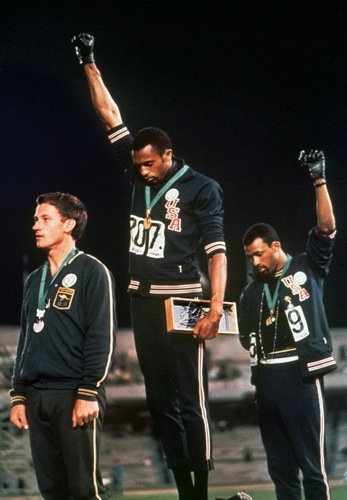
SMITH AND CARLOS AT THE 1968 MEXICO CITY GAMES
Although they were banished by the IOC afterwards for breaking rule 50, and “returned home to a wave of opprobrium,” Carlos regrets nothing. “To be heard is greater than a boycott,” he told reporter Dave Zirin this year when asked to give advice to LGBT and ally athletes at Sochi. “If you stand for justice and equality, you have an obligation to find the biggest possible megaphone to let your feelings be known.” The Olympics are a globe-sized megaphone, and people at all levels will get a chance to wield it—leaders of nations, heads of committees, CEOs, reporters, coaches, athletes, fans. The whole world watches the Olympics. Let’s find a way to make sure they listen, too.
All Tokes Aside: Making A Very Serious Case for Marijuana
Attorney General Eric Holder spoke to the American Bar Association in San Francisco yesterday to announce revisions to decades-old policies that were enacted as part of the War on Drugs in the 1980s. His remarks come on the heels of Dr. Sanjay Gupta’s recent piece for CNN entitled “Why I Changed My Mind On Weed;” together the two men exemplify a shift in attitudes toward drug use and criminalization in America.
In Gupta’s article, the neurosurgeon and chief medical correspondent for CNN apologizes for not supporting medical marijuana in the past and chastises harm-based marijuana research and governmental policies that sustain unnecessary barriers to its use.
I didn’t look hard enough, until now. I didn’t look far enough. I didn’t review papers from smaller labs in other countries doing some remarkable research, and I was too dismissive of the loud chorus of legitimate patients whose symptoms improved on cannabis. Instead, I lumped them with the high-visibility malingerers, just looking to get high. I mistakenly believed the Drug Enforcement Agency listed marijuana as a schedule 1 substance because of sound scientific proof. Surely, they must have quality reasoning as to why marijuana is in the category of the most dangerous drugs that have “no accepted medicinal use and a high potential for abuse.” They didn’t have the science to support that claim, and I now know that when it comes to marijuana neither of those things are true.
Gupta’s change of heart came from speaking with “medical leaders, experts, growers and patients” from around the world as research for his new CNN documentary “Weed,” which aired on Sunday. By seeing firsthand how professionals and patients had been able to solve medical ailments and suffering through the medicinal use of marijuana, he was forced to confront a long-held notion that marijuana is dangerous or lacks positive attributes.
The statements of both Dr. Gupta and Attorney General Holder prove that America is a country currently contemplating — and changing their minds — about the future of the drug war, and in particular, the war on marijuana. Though using many substances remains taboo, shifting attitudes reveal a growing acceptance for not only medicalizing, but legalizing, marijuana.

For the past three years, a slight and growing majority of Americans have consistently claimed in polls to support the legalization of marijuana use; acceptance for medical marijuana rests even higher at 81 percent, and 76 percent of doctors support its use. There is a “marijuana majority” in this country composed of people of radically different backgrounds and lifestyles: Christian leaders, Hollywood celebrities, medical professionals, law enforcement officials, lawyers, everyday people, and lawmakers from across the political spectrum see some form of benefit in relaxing the restrictions in place on recreational and/or medicinal marijuana. It’s hard to argue with said majority about the rationality of their beliefs; aside from being a logical legislative goal based on public opinion, the benefits of decriminalizing marijuana and taking steps toward ending the drug war are scientifically and economically sound.
Medically Speaking
The medical benefits of marijuana have been up for debate since as early as 2737 B.C, when “the mystical Emperor Shen Neng of China was prescribing marijuana tea for the treatment of gout, rheumatism, malaria and, oddly enough, poor memory.” Using marijuana medicinally spread afterward through Asia, the Middle East, and Africa for a range of symptoms; by the 18th century, American medical journals were making commonplace recommendations for the use of hemp seeds medicinally. In 1914, drug use became illegal in America. By 1937, 23 states had outlawed sweet mary jane, and in the ’50s, marijuana possessors and distributors became criminals under federal law. It wouldn’t be until 1996, when California legalized medical use of the plant once more, that attitudes began shifting back toward normalization of weed.
It’s currently legal to smoke marijuana medicinally in twenty states.
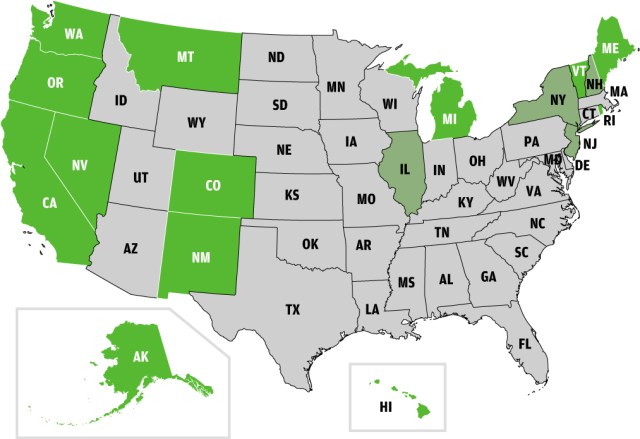
The medical applications of marijuana are basic science, and they’ve been proven by various studies. The Center for Medical Cannabis Research (CMCR) found in May of 2012 that medical marijuana eased the symptoms of MS. The National Organization for Reform of Marijuana Laws (NORML) have data in their library supporting the use of marijuana to treat various forms of pain, nausea, spasticity, glaucoma, and movement disorders; they also found that marijuana’s role as an appetite stimulant can be used to treat “patients suffering from HIV, the AIDS wasting syndrome, or dementia.” In 2001, research in The Journal of Neuroscience found that marijuana “can serve to protect the brain against neurodegeneration.”
Igor Grant of the CMCR spoke to the Huffington Post’s Cara Santa Maria in 2012 about the various medical applications of marijuana:
IG: I think the emerging evidence for medicinal uses of cannabis are strongest now for management of pain, and particularly for the management of a type of pain that is chronic and difficult to treat called neuropathic pain that we see that people with AIDS have, some people with diabetes, and certain kinds of injuries.
CSM: That’s no small thing. And we know that marijuana controls nausea and vomiting and increases appetite. This helps not only HIV and AIDS patients, but also those with dramatic weight loss due to cancer treatments like chemotherapy… See, in a broad sense, Tetrahydrocannabinol, or THC, works like any other drug does. It’s an exogenous chemical, meaning that it occurs outside of us, in nature (like in marijuana). But it mimics endogenous factors–ones that we produce within our bodies, notably in our brains. The active constituents in cannabis are called cannabinoids. THC is only one of them. Scientists have identified, isolated, or synthesized several different cannabinoids that bind to two main receptor types in the human brain. And this receptor binding and associated downstream signalling activity causes the psychotropic and therapeutic effects that come along with smoking weed. It gets you high, can ease your pain, and makes you hungry, among other effects. But what about the million dollar question: is smoking pot bad for you?
IG: For typical adults who are using marijuana modestly…there don’t seem to be very many biological or medical consequences.
CSM: Well, there you have it. So why is it still illegal? Attempting to make this issue black-and-white sounds pretty political to me, not very scientific.
While research into the uses for medical marijuana appear to be bountiful and conclusive, research on its negative impact on the body or mind have yet to discover much of any fault. Last year, I came bearing good news about its non-impact on your lungs. The year before, it was discovered that people who smoked often had high IQs. Despite the drug being classified as a “Category 1” substance — alongside narcotics like heroin — research from as far back as 1998 substantiates claims that it is pretty much harmless.
Tetrahydrocannabinol is a very safe drug. Laboratory animals (rats, mice, dogs, monkeys) can tolerate doses of up to 1,000 mg/kg (milligrams per kilogram). This would be equivalent to a 70 kg person swallowing 70 grams of the drug—about 5,000 times more than is required to produce a high.
A study from July completed by Donald P. Tashkin of the David Geffen School of Medicine at UCLA, found that “studies do not substantiate claims that [marijuana] is… associated with the development of lung cancer, chronic obstructive pulmonary disease, emphysema, or bullous lung disease.”
“Overall,” he writes, “the risks of pulmonary complications of regular use of marijuana appear to be relatively small and far lower than those of tobacco smoking.”

It’s the Economy, Stoner
Our laws currently prohibit recreational and often medical use of the drug in all forms; that’s costing us big money, big time, and lots of humanity. According to Doug Fine, author of the new book Too High To Fail, legalization could “help save the US economy, reduce the prison population, and stop the drug war death toll.” Since President Nixon’s emboldening of the war on drugs, America has watched as over $1 trillion went up in smoke. The drug war has overhead costs of close to $40 billion dollars annually, and that’s only on the federal level. (Many states step it up with their own DEA. Double your pleasure, double your fun!) Even the conservative Cato Institute has spoken out about the “economic case for legalizing drugs,” reporting in 2010 that legalizing marijuana alone would save $8.7 billion a year and produce another $8.7 billion in government tax revenue if widely available.
Perhaps the most sound proof that marijuana’s illegality is a loss for this country economically is data showing that a majority of illicit drug arrests are related to marijuana. We’re spending billions on stoners. Despite falling numbers of marijuana arrests overall, it remains the onus of approximately 43 percent of all drug offenses in America.
“As in past years, the so-called ‘drug war’ remains fueled by the arrests of minor marijuana possession offenders,” NORML Deputy Director Paul Armentano said. “Cannabis prohibition financially burdens taxpayers, encroaches upon civil liberties, engenders disrespect for the law, impedes upon legitimate scientific research into the plant’s medicinal properties, and disproportionately impacts communities of color. It’s time to stop stigmatizing and criminalizing tens of millions of Americans for choosing to consume a substance that is safer than either tobacco or alcohol.” Of those charged in 2011 with marijuana law violations, 663,032 (86 percent) were arrested for marijuana offenses involving possession only. The remaining 94,937 individuals were charged with “sale/manufacture,” a category that includes virtually all cultivation offenses.
Those numbers seem wholly unreal considering that marijuana both serves proven medicinal and therapeutic purposes and causes less harm than most, if not all, other legal and illegal narcotics and addictive substances.
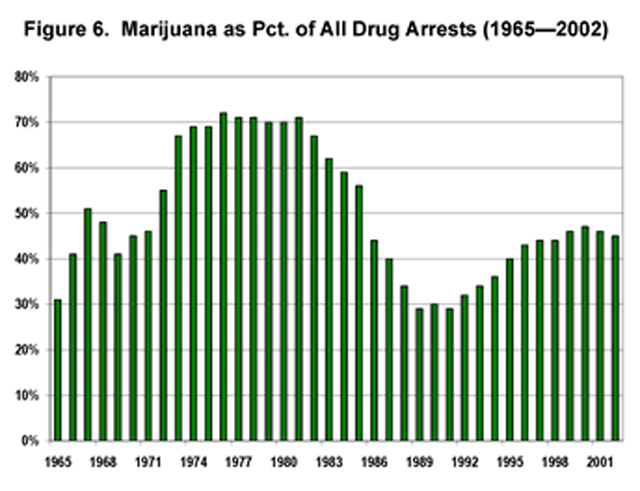
Have Some Humanity
Part of the economic toil of the drug war lies in the human lives affected by incarceration and arrest for illicit drug violations; one of the most problematic aspects of the “war,” in philosophy and in practice, has been the racial disparity presented by the convictions.
The inherent racism of the war on drugs began at “marijuana.” When weed was legal and widely accepted, “cannabis” was the preferred term; as advocates attempted to enact legislation limiting and banning its use, they began calling it marijuana in order to evoke “Mexican-ness” and thus use anti-immigrant sentiment (and its corresponding anxiety over immigrants “taking American jobs”) to their political advantage.
Police officers in Texas claimed that marijuana incited violent crimes, aroused a “lust for blood,” and gave its users “superhuman strength.” Rumors spread that Mexicans were distributing this “killer weed” to unsuspecting American schoolchildren. Sailors and West Indian immigrants brought the practice of smoking marijuana to port cities along the Gulf of Mexico. In New Orleans newspaper articles associated the drug with African-Americans, jazz musicians, prostitutes, and underworld whites. “The Marijuana Menace,” as sketched by anti-drug campaigners, was personified by inferior races and social deviants.”
The racially charged backbone of the war on drugs didn’t just stop there, and it prevails to this day: despite the fact that drug users and sellers in the United States are most often (SURPRISE!) white, incarceration rates across the board — not just those related to marijuana — show that race is a factor in who is being apprehended for said crimes. Marijuana is no exception: in California, 64% of marijuana possession arrests made in 2010 claimed nonwhite folks; in Washington, DC, a recent study showed disparate arrests for drug possession targeting those of African-American descent over all other ethnic groups. Nationally, black youth are arrested for drug crimes at a rate ten times that of their white counterparts.
For marijuana in particular, blacks were reported to be 3.7 times more likely to be arrested for possession in 2010 than whites by the ACLU:
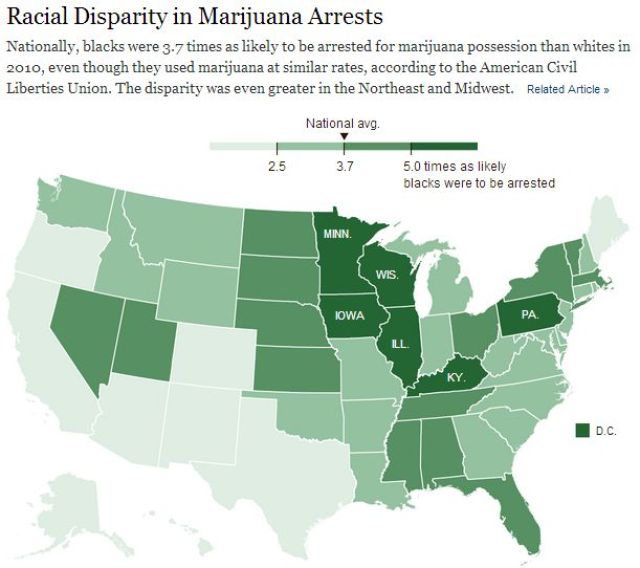
The “War on Drugs” has claimed human lives through minimum sentencing, “three strike” laws, and raids targeting those guilty of low-level possession for prison. Almost 500,000 people are in prison for drug sentences, and almost half were only guilty of possession.
The Attorney General’s statements yesterday, however, echo a growing sentiment about all drug arrests and convictions: that they are wasteful of human potential and causing more social ill than any benefits they may subsequently create or uphold. In his statements, Holder announced changes in Justice Department policy that took into account the failures of the drug war, including reforming mandatory minimum sentences for non-violent drug offenders, encouraging drug treatment and/or community service programs as opposed to prison for drug offenders, and releasing elderly, non-violent offenders. Although he did not directly criticize the philosophies behind the drug war, he addressed many of its main consequences: prison overcrowding and racial disparities in sentencing.
“We need to ensure that incarceration is used to punish, deter and rehabilitate,” Holder said, “not merely to convict, warehouse and forget.”
Holder’s comments are more or less in line with President Obama’s administration. Obama has come out against the drug war during both campaigns, though his gains in that department are less than ideal. The Obama administration has supported medicinal marijuana by refusing to use federal power to punish those involved in growing and selling the plant for medical purposes; the administration’s policies also consistently stress a focus on rehabilitation rather than incarceration. But that is not enough, and often the words of Obama’s administration on this front have been hard to believe or without real meaning. Dispensaries are still being raided and shut down in states where marijuana is legal. A recent segment on NPR discussed the need for reformation in preparation for his remarks and, thus, defined the largest failure of the drug war: a failure to end drug use with harsh punishments.
We seem to be at a point now, an inflection point, where more and more people on both sides of the political aisle are realizing that we cannot incarcerate our way out of our drug problems, particularly following the financial crisis, where state governments are just strapped, especially California but not including many, many others. They realize they just can’t afford to just to keep locking up so many people for so long, for usually very minor drug busts.
The drug war in its entirety has been a flawed operation, but the prohibition of marijuana stands out as one of its main failings. After all, in a country where drugs which actually damage and destroy lives are available for cheap on the black market, government officials are wasting time and energy convicting young people for carrying their weed to class; in a country where addiction to controlled substances is rampant, a natural and healthy alternative to entire concoctions of them is often unavailable, illegal, and stigmatized. Luckily, comments like Holder’s and a growing acceptance for weed obvious in Dr. Gupta’s recent induction into the marijuana majority make one thing about the drug war clear: it’s falling apart.
In a political landscape where a majority of Americans have finally come around to blunt blowin’, it’s become increasingly clear that marijuana legalization is right around the corner. Just sit back, hit the bong, and wait for it.
At Last, Obama Gives America Some Real Talk On Racism
Earlier this week, President Barack Obama released a restrained statement on the Trayvon Martin verdict which expressed empathy for Trayvon’s family and implored Americans to “ask ourselves if we’re doing all we can to widen the circle of compassion and understanding in our own communities.” Gun violence was the only specific “issue” Obama addressed in his statement, suggesting Americans “ask ourselves if we we’re doing all we can to stem the tide of gun violence that claims too many lives across this country on a daily basis.” Although it was arguably bold for Obama to make a statement on the case at all, he did leave out the one issue so many Americans were hoping Obama would squarely address: race. Obama did, after all, invoke that issue last year when he noted that if he had a son, his son would look like Trayvon — a statement which was met with hysterical conservative backlash.
So the White House Press Corps weren’t the only humans surprised when Obama unexpectedly made an appearance at this morning’s White House briefing specifically to address, in more depth, the Trayvon Martin case. For the first time since March 2008, when Obama delivered a speech entitled “A More Perfect Union” in response to the controversy over his association with Reverend Jeremiah Wright, Obama talked for a long time, in front of other human beings, about racism within a historical context and how that contributes to “the kindness and cruelty, the fierce intelligence and the shocking ignorance, the struggles and successes, the love and yes, the bitterness and bias that make up the black experience in America.”
“A More Perfect Union” was a huge moment in the Obama campaign, but it’s one that’s easy to forget when, as cited in Fredrick C. Harris‘s 2012 article The Price Of A Black President, “Mr. Obama, in his first two years in office, talked about race less than any Democratic president had since 1961. From racial profiling to mass incarceration to affirmative action, his comments have been sparse and halting.” This is especially troublesome because The Right has used Obama’s presidency to re-ignite racial tensions in the US on a massive scale, making it more clear than ever that we’re nowhere near a “color-blind” or “post-racial” society. Research has shown that Americans expressing “explicit anti-black attitudes” leapt from 47.6% in 2008 to 50.9% in 2012 and that “Mr. Obama’s approval rating has been 2 to 3 percentage points lower in 2010 and 2012 than it would have been in the absence of anti-black attitudes.”
But today, Obama reminded the American people that he is totally aware that racism is still a Thing! His speech wasn’t perfect, and there were times when more should have or could have been said, and times when his own administration’s culpability on many race-related issues was gamely sidestepped, and I want to talk about those things. But his speech was also the best news I’ve read all week, and I’m surely not alone in being thrilled to hear he’s been talking to his staff about racism in America and that this verdict has inspired him like it’s inspired so many people to have these conversations. He finally said something, and he said it knowing that the backlash will be fierce and unfair.
Obama opened by acknowledging that the judicial system worked how the system works and that he wouldn’t be debating the legal issues in the case. Then he launched into the heart of the matter — “context.”
You know, when Trayvon Martin was first shot, I said that this could have been my son. Another way of saying that is Trayvon Martin could have been me 35 years ago. And when you think about why, in the African- American community at least, there’s a lot of pain around what happened here, I think it’s important to recognize that the African- American community is looking at this issue through a set of experiences and a history that — that doesn’t go away.
Obama noted that all or most African-American men in this country have been followed while shopping, heard locks click on the doors of cars as they walked past, seen women clutch their purses nervously while on elevators; and that these experiences “inform how the African-American community interprets what happened one night in Florida.” AMEN.
I was relieved and surprised (in a good way) when he acknowledged “a history of racial disparities in the application of our criminal laws, everything from the death penalty to enforcement of our drug laws.” I was relieved and surprised (in a good way) when he acknowledged that “the poverty and dysfunction that we see in those communities can be traced to a very difficult history.” I was relieved and surprised (in a good way) when Obama acknowledged that “the fact that sometimes [historical context is] unacknowledged adds to the frustration.” (Also, that part was super meta.)
I was surprised in a weird way, however, by his statement that “the African-American community [isn’t] naive about the fact that African-American young men are disproportionately involved in the criminal justice system, that they are disproportionately both victims and perpetrators of violence.” He then continued that he’s not aiming to “make excuses for that fact” but that “black folks do interpret the reasons for that in a historical context.”
It initially took me off-guard for a few reasons, one of them being that by singling out “black folks” (intentionally or not) as the ones who interpret those reasons in a historical context, he suggested that the evidence is such that only black people would see this happening in a historical context, when truthfully the evidence is such that anybody presented with said evidence should see it that way. It’s something all of us are capable of understanding, if we choose to, and we shouldn’t put the burden of that knowledge and understanding only on black folks. Although his choice of using “the criminal justice system” instead of “criminal activity” is crucial, the ensuing “black folks see it like this” qualifier could obscure that distinction.
The distinction is important, though, since white folks and black folks who commit the same exact crime will face very different penalties and because numerous laws have been passed to enable police to blatantly target people of color (such as Stop-and-Frisk, a policy championed by the New York City police commissioner Obama endorsed this week) and because poor people of color who are wrongly accused, excessively sentenced or who acted in self-defense often lack access to the legal representation that could get them acquitted.

via colorlines
All that being said, a lot of what rubbed me wrong in the transcript comes across far better when you watch the video. In the video, it’s clear that he’s stating how unfair it is for people to use those statistics to paint African-American boys with a broad brush, a series of statements leading to this crucial culminating point: “that all contributes, I think, to a sense that if a white male teen was involved in the same kind of scenario, that, from top to bottom, both the outcome and the aftermath might have been different.” His emphasis of the word “statistically” when spoken out loud is also lost in the transcript.
I would’ve loved to hear specific examples of this historical context, or at least an acknowledgment that the history of African-American oppression isn’t, as most of us are taught, a two-chapter tale about slavery and the Civil Rights Movement. The systematic disenfranchisement of African-Americans has many chapters, each a new example of how the wealthy white elite have persisted, through decade after decade of alleged progress, in finding new ways to suppress growth and power in African-American communities and often to prevent African-Americans from garnering that significant political capital or power in the first place.
The emphasis on historical context also leaves out the importance of a present context Obama is complicit in perpetuating: the fact that a corrupt and viscously racist criminal justice system, fueled primarily by the viscously racist and entirely misguided “War on Drugs,” is destroying poor black communities and stacking the deck against young black boys regardless of criminality. Unjust mass incarceration has a destructive ripple effect on entire communities and even a single arrest for a non-violent crime can result in multi-year sentences followed by a insurmountable set of obstacles upon release which deny formerly incarcerated individuals the chance to take the jobs and obtain the health care they need to improve their lives and the lives of their families.
Obama then suggested “a couple of specifics” on what to do now, asking “how do we learn some lessons from this and move in a positive direction?” The first specific is that the Justice Department at the state and local levels should look at reducing “the kind of mistrust in the system” that “sometimes currently exists.” For this, Obama mentioned racial profiling legislation he passed in Illinois regarding traffic stops, which he said led even resistant police departments to see that cracking down on racial profiling-driven traffic stops helped them “do their jobs better.”
He’s referring to The Illinois Traffic Stop Statistical Study Act of 2003, which collected data on the race of citizens pulled over and searched in random traffic stops and which has been referred to by the ACLU as “arguably the best statute of its kind in the nation.” See, due to a biased and problematic extension of the Fourth Amendment enacted by the Supreme Court in the early ’90s as part of the “war on drugs,” officers are permitted to pull anybody over for any traffic violation and use these stops to conduct drug investigations or searches without probable cause. The officers must ask for consent before searching, but studies have shown 95 percent of all drivers consent to searches, usually unaware they’re not legally required to do so. The data harvested in Illinois revealed “black drivers are anywhere from 1.8 to 3.2 times more likely than white drivers to be consent-searched. Latino drivers ranged from 2.9 to 4 times more likely to be searched than their white counterparts.” But the ACLU is still pressuring the Illinois government to actually take significant action towards changing those numbers.
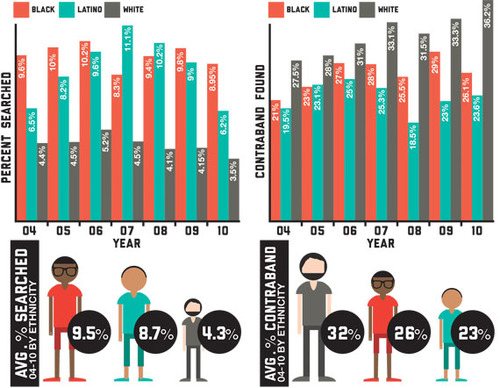
infographic from the portland mercury’s investigation into racial profiling at traffic stops executed by the portland police department
Obama’s next suggestion was “for us to examine some state and local laws to see if it — if they are designed in such a way that they may encourage the kinds of altercations and confrontations and tragedies that we saw in the Florida case, rather than diffuse potential altercations.” He called everybody out by invoking the fact that America may not have looked so favorably on Trayvon Martin standing his ground, which was another triumphant moment in his speech.
This examination of state/local laws is crucial because, as Michelle Alexander writes in The New Jim Crow, Federalism (the division of power between the states and federal government), was a device employed by the Founding Fathers specifically “to protect the institution of slavery and the political power of slaveholding states.” In other words, white supremacy has enabled “Stand Your Ground” from day one, and day one was a really long time ago. Federalism itself isn’t corrupt, obviously (although I don’t really know enough about politics to comment), but all systems initially rooted in a racist agenda deserve ongoing interrogation. (Like the US government!) Furthermore, research has shown that Stand Your Ground laws have not decreased homicide rates (they’ve increased, actually), and in Florida, 73% of people who killed an African-American and invoked the Stand Your Ground laws faced absolutely no punishment.
The highlight of his speech was his next suggestion, a call to “spend some time in thinking about how do we bolster and reinforce our African-American boys,” asking, “there are a lot of kids out there who need help who are getting a lot of negative reinforcement. And is there more that we can do to give them the sense that their country cares about them and values them and is willing to invest in them?” This is the kind of top-down philosophy that our country desperately needs, and it’s meta in a way, too — because the president is in an excellent position to “give them the sense that their country cares about them.” I’ve avoided reading any reactions to this speech until I’m done writing about it, but I did follow a G-Chatted link to this article on The Prospect, where Jamelle Bouie justly declared that “no president has ever asked Americans to try to imagine the perspective of a black boy. It’s a powerful appeal, and my hope is that the public will take it seriously.”
Here’s what Obama said:
…there are a lot of good programs that are being done across the country on this front. And for us to be able to gather together business leaders and local elected officials and clergy and celebrities and athletes and figure out how are we doing a better job helping young African-American men feel that they’re a full part of this society and that — and that they’ve got pathways and avenues to succeed — you know, I think that would be a pretty good outcome from what was obviously a tragic situation. And we’re going to spend some time working on that and thinking about that.
I like how Obama refrained from placing that responsibility solely on the shoulders of parents, as is so often done in these cases, and extended his call to action to all of society to help young African-American men. This will happen on a person-to-person level, but it will also be important for all of us, and our elected officials and Obama himself, to look at the bigger picture, like how mass incarceration has burgeoned in popularity as the latest incarnation of Jim Crow and how the local-taxpayer-funded public education system dramatically favors white students and gives children of color few tools for success and few chances to escape the circumstances they were born into, especially with the recent blows to affirmative action policies. We need to talk about access to healthy food and how fast food and processed food marketers target African-Americans and kids of color. We need to talk about barriers to health care, and how people of color are treated differently by doctors, and how important health care reform is to closing these gaps. We’ll also need to look at the importance of media visibility, the lack of representation of people of color in Film & TV and fair and accurate media representation. We need to acknowledge the psychological impact of racism on its targets, and what so much discrimination does to the human heart.

via fast company
Obama ended his speech with a call to all of us “to do some soul-searching,” and host our own conversation on race. He notes that politicians haven’t been “particularly productive” when organizing these conversations, but that perhaps in our “families and churches and workplaces” (he somehow forgot to mention “lesbian websites”?) there is an opportunity for greater honestly:
…there’s a possibility that people are a little bit more honest, and at least you ask yourself your own questions about, am I wringing as much bias out of myself as I can; am I judging people, as much as I can, based on not the color of their skin but the content of their character? That would, I think, be an appropriate exercise in the wake of this tragedy.
Furthermore:
…we have to be vigilant and we have to work on these issues, and those of us in authority should be doing everything we can to encourage the better angels of our nature as opposed to using these episodes to heighten divisions. But we should also have confidence that kids these days I think have more sense than we did back then, and certainly more than our parents did or our grandparents did, and that along this long, difficult journey, you know, we’re becoming a more perfect union — not a perfect union, but a more perfect union.
This week I’ve been stunned, time and time again, by the defensiveness around the Zimmerman verdict I’ve seen on comment threads throughout the internet, especially on liberal feminist websites including this one. (The comments we’ve disapproved this week would make your head explode!) Why, exactly, are so many white feminist and liberal women seemingly so invested in proving that Zimmerman wasn’t racist or that the verdict was just? How can anybody reasonably propose that “racism goes both ways” when by definition, it does not? Some of this, I think, comes from people attempting to reconcile their beliefs with those of their family and IRL community and some comes from people around the world unfamiliar with America’s specific brand of racism.
But I think most of it comes from somewhere else: my latest theory is that this level of defensiveness must be personal. I suspect that this rampant defensiveness is rooted in a fear that if so many of us feel comfortable unequivocally stating that Trayvon’s attack was racially motivated, that means we’re comfortable identifying racism even in cases where racism was not explicitly expressed, and that means that refraining from explicitly/loudly expressing a racist thought/motivation is not enough to exempt a person from being called out for racism. Which means all white people are indicted, as are all of us who have bought into America’s white supremacy consciously or unconsciously, because all white people are racist, to some degree, whether we want to admit it or not. Maybe sometimes the callouts will be unfair, but it’s important for a lot of us to remember moving forward that focusing too much on whether or not we’re being called “racist” isn’t the point. Give up. You’re racist. I’m racist. We are part of the problem, I am part of the problem. I think a lot of us need to accept that, we need to listen, and then we need to move on to actually being helpful by attacking the issues at stake — together.
Like this issue: what do we do now?

Also.Also.Also: Happy Birthday, Pride Flag and Other Stories We Missed This Week
You guys I have off on July 4 AND July 5. This was the breaking news of my own life, but here’s the stories we missed this week while I wasn’t planning a BBQ.
Facebook Gets Proud
70% of Facebook users have a gay friend, (I think 70% of my Facebook friends are gay) which probably explains their new gay pride emoticon. And SPEAKING OF PRIDE, HAPPY BIRTHDAY PRIDE FLAG. YEAH, YOU. YOU, RAINBOW FLAG OVER THERE. HAPPY FUCKING BIRTHDAY.

Examples of The Government Actually Working / Being Great
+ The Department of Education will now collect data about anti-LGBT bullying.
On May 22, I was at the White House for a Harvey Milk Day event, accompanying a delegation of GLSEN student leaders and staff. As we waited for the program to begin, a senior official from the Department of Education came running over to one of our students, Liam Arne.
“I need to shake your hand,” he said.“Because of you, the Secretary of Education is adding LGBT students to one of the most important Department of Education data collection instruments. You asked in that meeting, and afterward he told us to get it done!” …
LGBT-inclusive data collection may seem like a wonky goal. But let me tell you, data drives decision-making, and what is measured is what is valued when it comes to government action. Liam, one of GLSEN’s amazing student leaders, secured a huge advance for LGBT youth nationwide.
+ Obama promoted LGBT rights, albeit quietly, on his most recent visit to Africa.
+ Meet the highest ranking gay person in the Department of Defense.
+ PAID SICK LEAVE IN NEW YORK! WOOOOO!
Colorlines and the Case of the Cute Queers
Tee headline of this article is “We’re Here, We’re Queer, And We Look Real Cute.” My work here is done.

Russell Brand Sucks
Surprise!!! Russell Brand is THE WORST.
Russell then continued to joke that he likes to make advances on all gay women – and will carry on until he has tested every relationship in the country.
He added: “I just do that with lesbians, like ‘come on, you’re not that lesbian. For heaven’s sake, you’re just being difficult now.’
“She’s [Clare Balding] in a happy relationship, isn’t she? I won’t rest, until every lesbian relationship in Britain has been disrupted by an unwelcome boorish Essex boy.”
May you never rest, sir.
Even More on DOMA
+ What does DOMA mean for elderly queers?
+ “Same Love” has been blowing up on the charts following the DOMA / Prop 8 victories, which makes Macklemore hella proud. Can we listen to “Same Love” now because it’s like my favorite song no lie.
+ The perfect gay marriage cover came from The New Yorker:
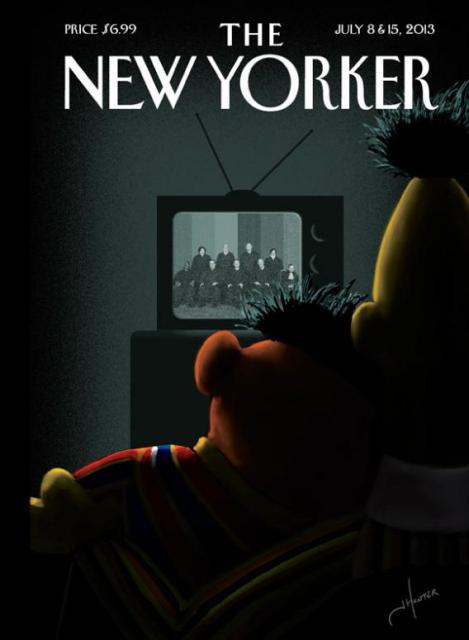
Classified: Queer Playwright Seeks Queer Filmmaker
I am seeking a lesbian- or queer-identified documentary filmmaker to work with on a project that will shoot in late-summer/early-fall of 2014. We would work together during the time leading up to that point on planning the project, and work together afterwards on post-production.
I will be taking a road trip around the US in the late-summer/early-fall of 2014 to visit lesbian lands, women’s and LGBT centers and/or communities, festivals, as well as bars and social spaces that bring together groups of lesbians and queer women. The purpose of those visits will to be share a play that I wrote inspired by the Lesbian Herstory Archives, and to interview those we meet about their methods of building, sustaining, and sharing communities, as well as the sharing their own stories and creative expressions.
Planning the trip will involve looking at the archived materials from Alexis Danzig’s 8,000 mile road-trip in the 1990s to raise awareness about the Archives through in-person slideshows. It will also draw on past lesbian and queer-identified groups like Sister Spit, who brought their work directly to a variety of communities, as well as theater companies like Missoula Oblongata, who work largely or entirely on the road.
WHO AM I? A lesbian/queer identified playwright and arts journalist. With experience self-producing shows/events in a variety of cities and circumstances.
INTERESTED? Send me an email at alexis@alexisclements.com and tell me a little bit about yourself, your experience making documentary films, and why you’re interested in working on this project.
You Should Give
Is it sexy when I boss you around? Either way, you should support these awesome projects.
+ K&A:
Created by Thompson Films, K&A is set in the city of Boston, and this comedy centers around Karly (straight) and Alex (lesbian) best friends since college, whose dysfunctional, co-dependent, drinking, and drug taking relationship impedes them from ever finding someone special in their lives besides each other.
Entangled with You is a romantic drama-comedy series about couples who complicate each other’s lives post separation. Faced with loneliness, change, and one unexpected bout of VD, new roommates Alisha and Jaliyah get an up close and unwanted look into each other’s personal business and somehow manage to see past their differences and overcome the awkwardness. Now if only their significant others were comfortable with that…
Into Girls is a series of vignettes that follow different lesbian characters. The story lines are mostly focused on the uncertainty of self and learning how to come into your own as a lesbian. Our experiences and inexperience drive the stories and style of the series.
+ One: A Story About Love and Equality
I raised money on Kickstarter and spent the spring of 2012 getting to know the people of North Carolina as they counted down to the amendment vote on May 8th.
After meeting dozens of people and acquiring over 200 hours of footage, I am thrilled to finally be able to share these amazing stories with the world.
I’ve edited all of the footage into a feature film, but we need finishing funds to polish the film, and promote it once it’s complete.
+ Youngist: Young People Powered Media
{Young}ist is a young people-powered website devoted to storytelling, artistic projects, and news analysis with staff and contributors all under the age of 26. We’re bringing artists and activists together to cross-pollinate and give voice to the stories of our generation.
We will publish multimedia content, written features, expressive long-form journalism, and innovative art forms that will provide a wide range of perspectives on culture and politics—all through the eyes and hands of youth.
You Should Go
+ Throw Down for a Cause w/ JULIE GOLDMAN
This year’s Throw Down will be bigger and badder than ever before! Do not miss the action as we take over Rich’s in Hillcrest on July 4th from 4pm to 9pm. Mark your calendars now!
This year all proceeds will be donated to The San Diego LGBT Center’s Sunburst Youth Housing Project, serving homeless LGBT youth, and Project Love Out Loud, an organization that provides comprehensive creative expression workshops to homeless and runaway youth. Help us make a difference!!
Doors open at 4pm and the party kicks off with 2 hours of hosted (open) bar from 4 – 6pm! The main event starts at 6pm.
Comedian Julie Goldman (of LOGO) is hosting this year’s event!
Join the ladies of Throw Down for a Cause 2013 as they head back into the ring and make this one MESSY July 4th! It was NEVER meant to be good clean fun!
The Sports Section
Gay and lesbian folks are really really into sports. Like, really.
Gay and lesbian consumers – professional athletes or not – are also sports enthusiasts off the courts and fields. In many ways, they’re bigger aficionados than average fans. For instance, adult gay and lesbian Internet users are 11 percent more likely than the average adult online to attend pro sporting events, according to Nielsen, and 7 percent more likely to participate in an adult sports league.
Gay and lesbian adults are 51 percent more likely than the average adult to watch sports-related videos online and 28 percent more likely to boot up their computer to get their sports news. They’re also big fans of fantasy sports, as they’re 39 percent more likely to play fantasy sports online than the average adult Internet user.
Lesbian Prom King
Meet Ola Wolan, lesbian prom king.

